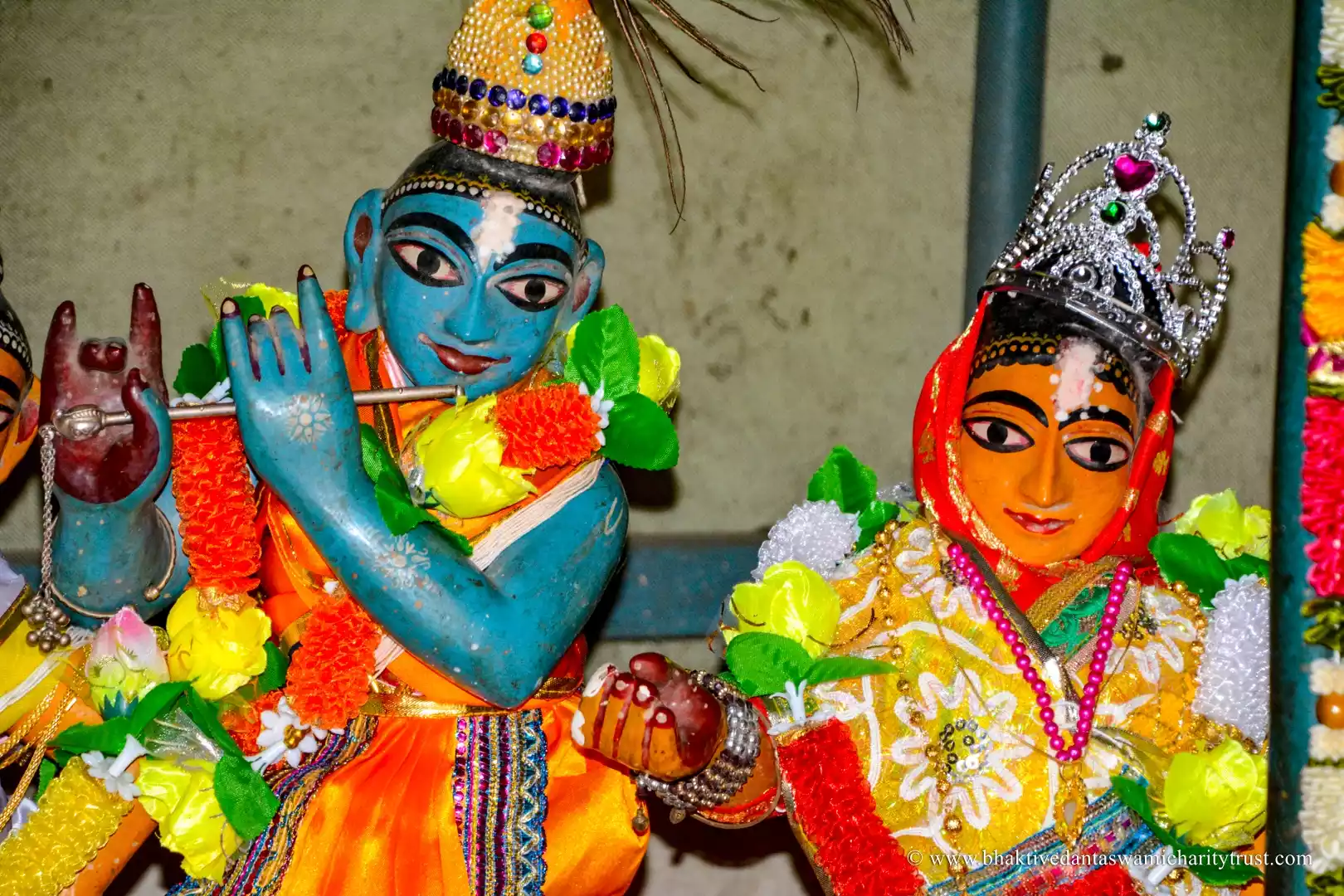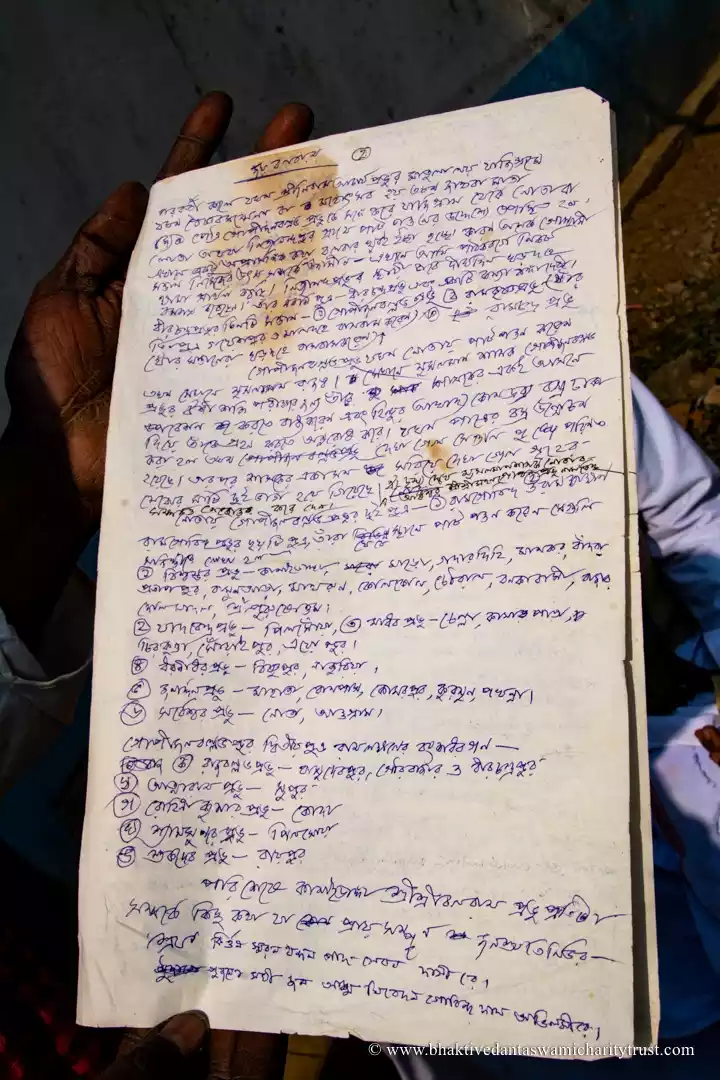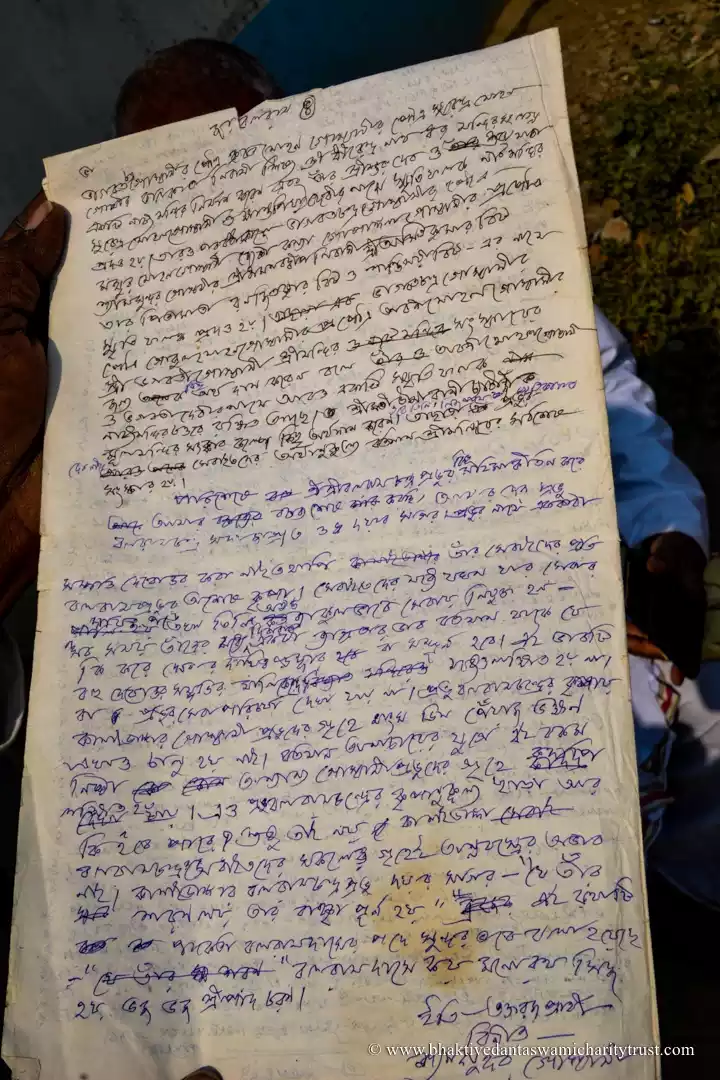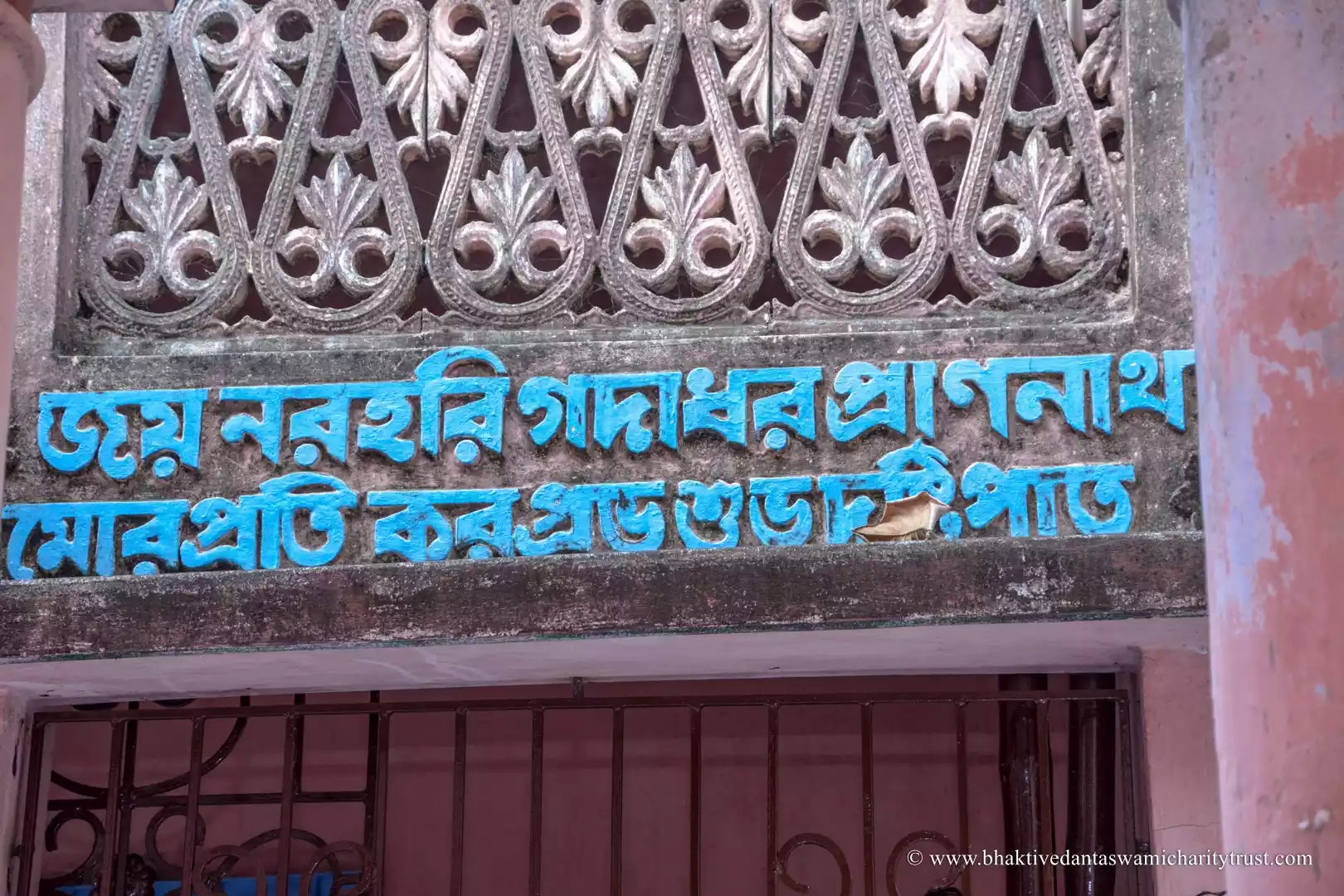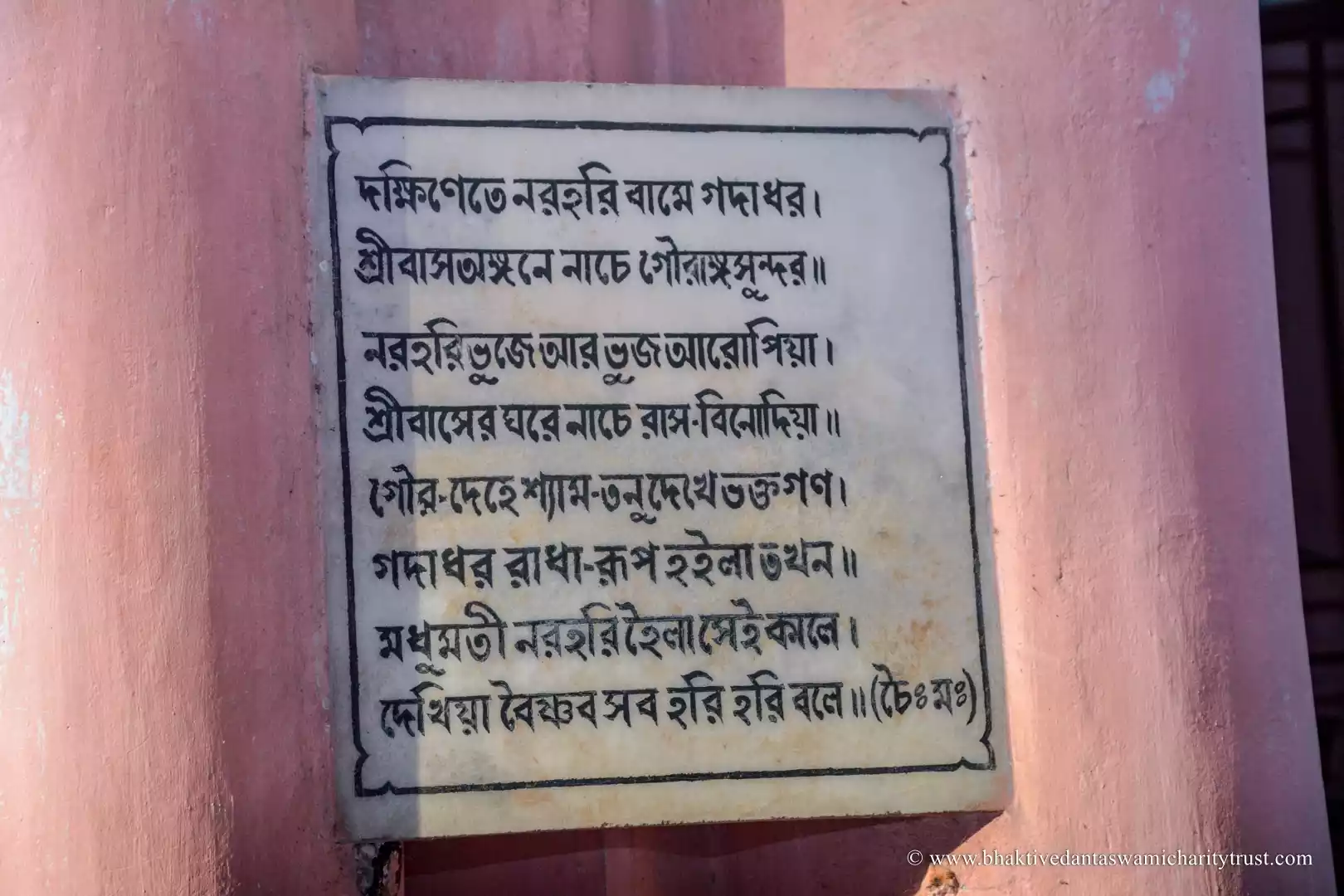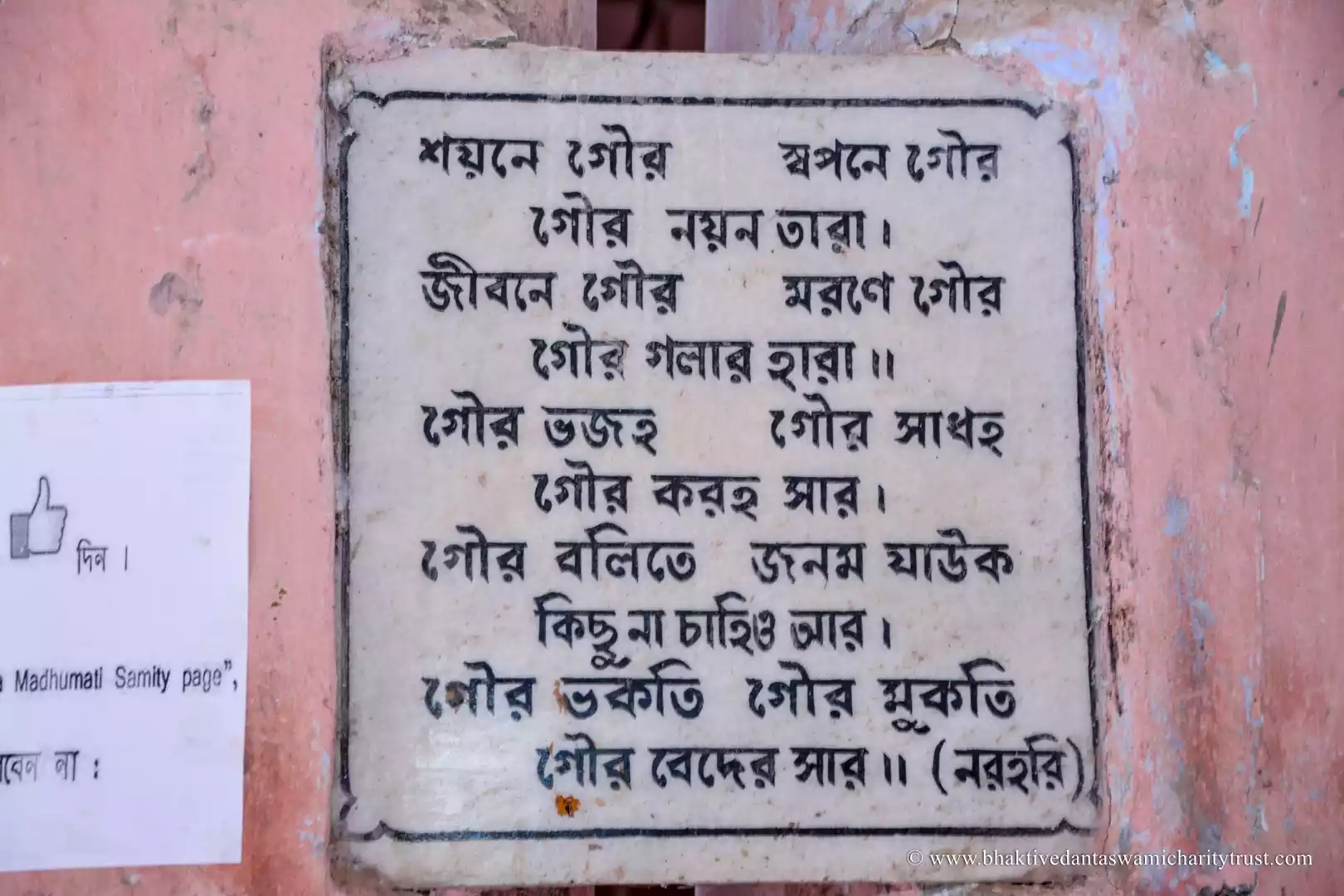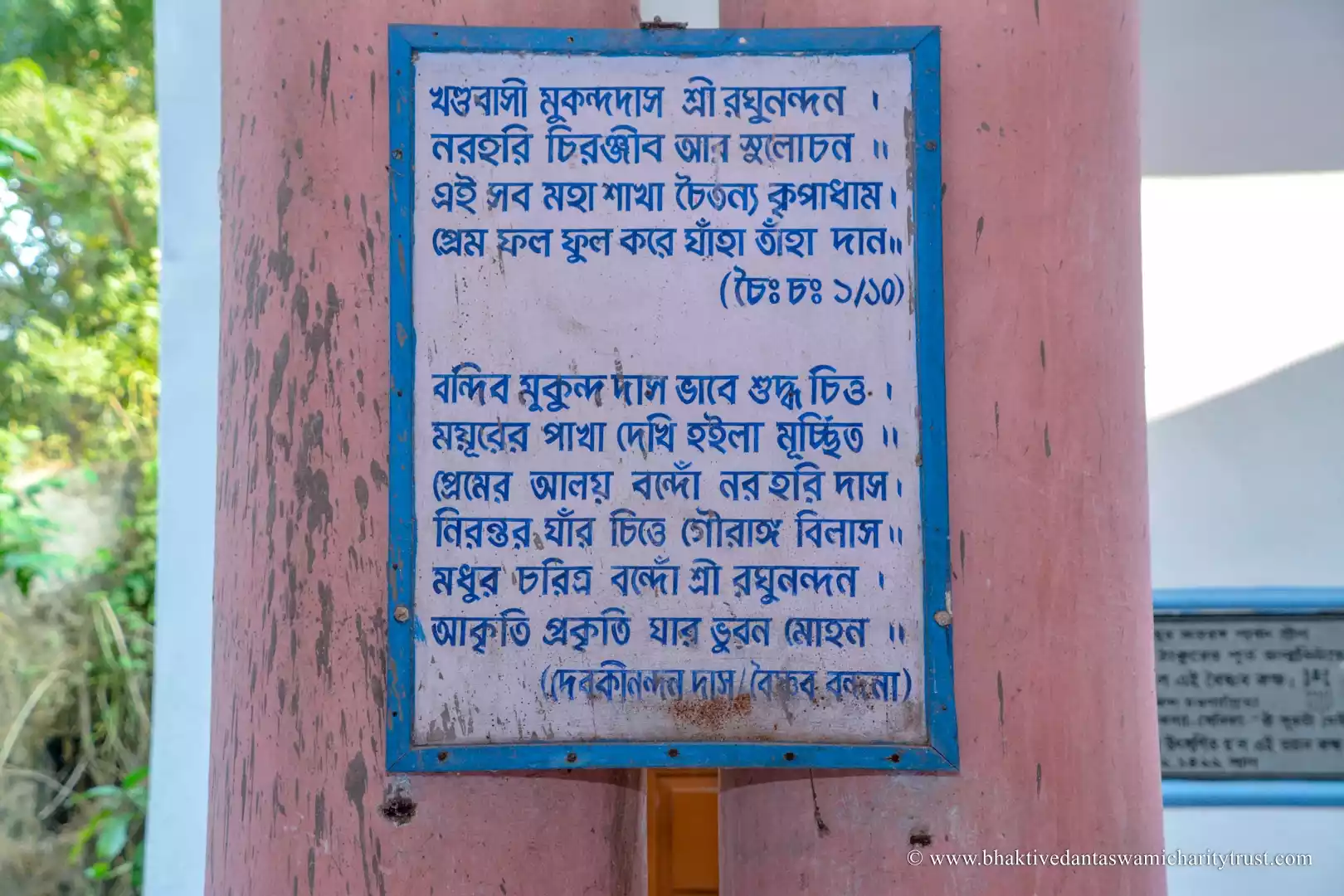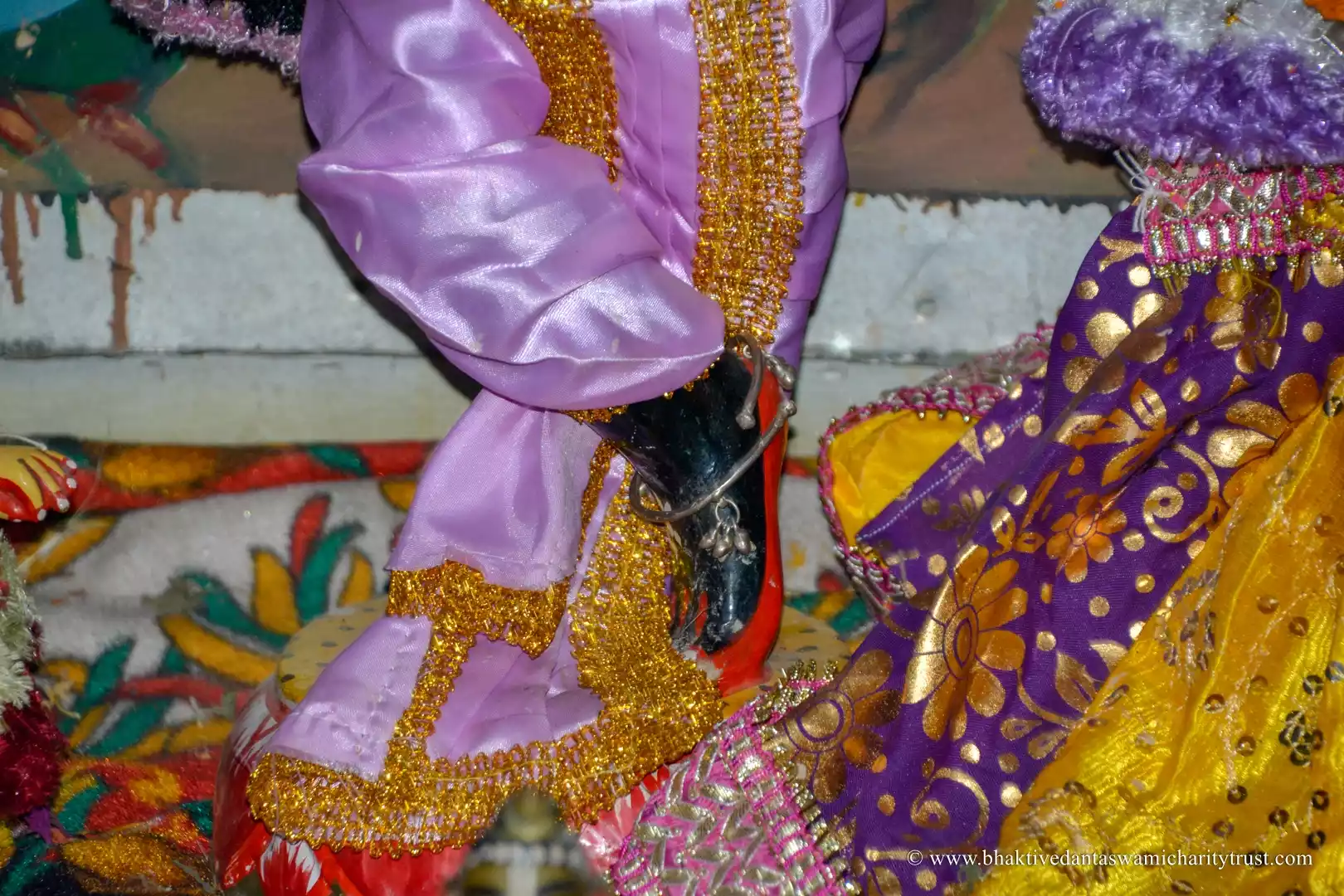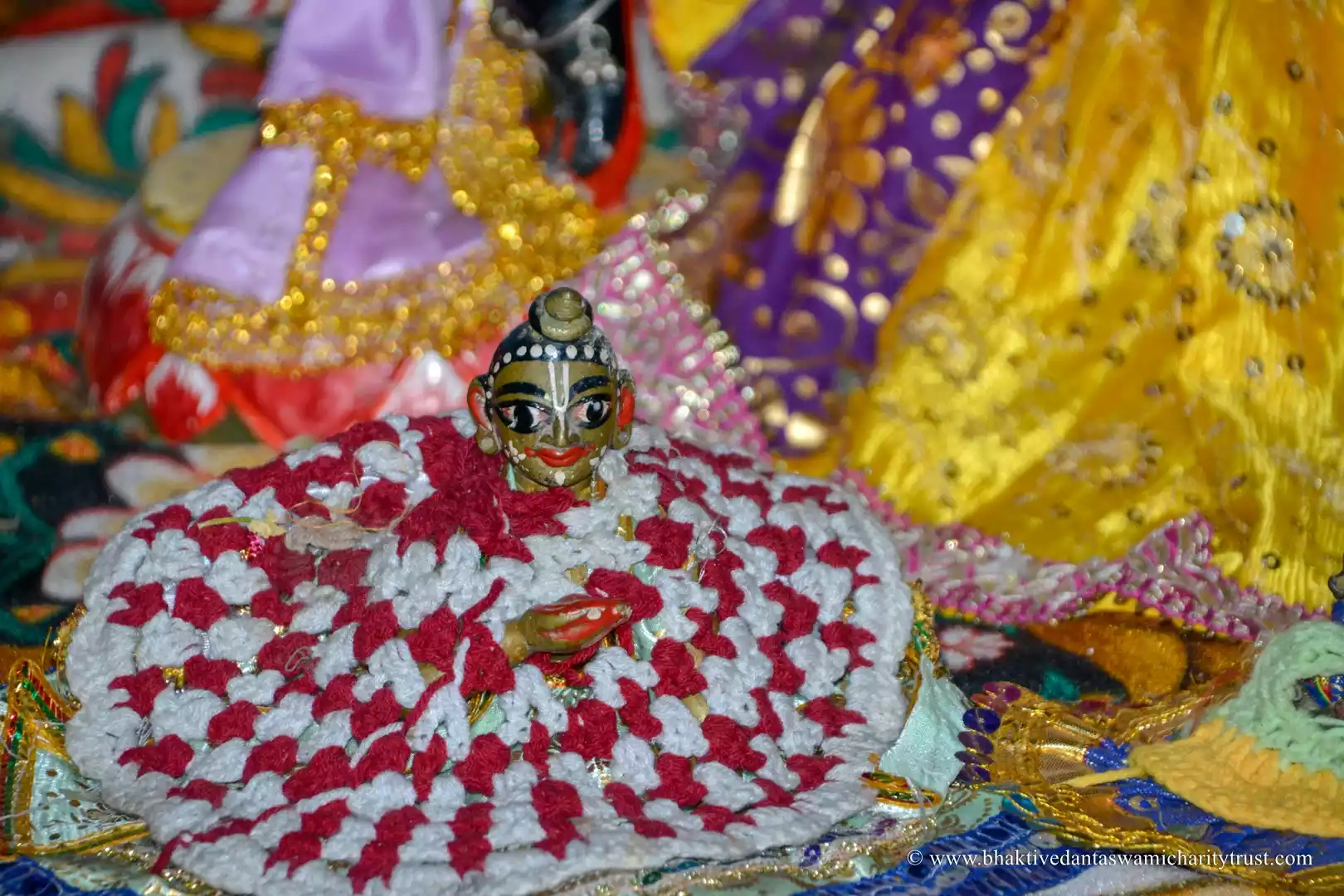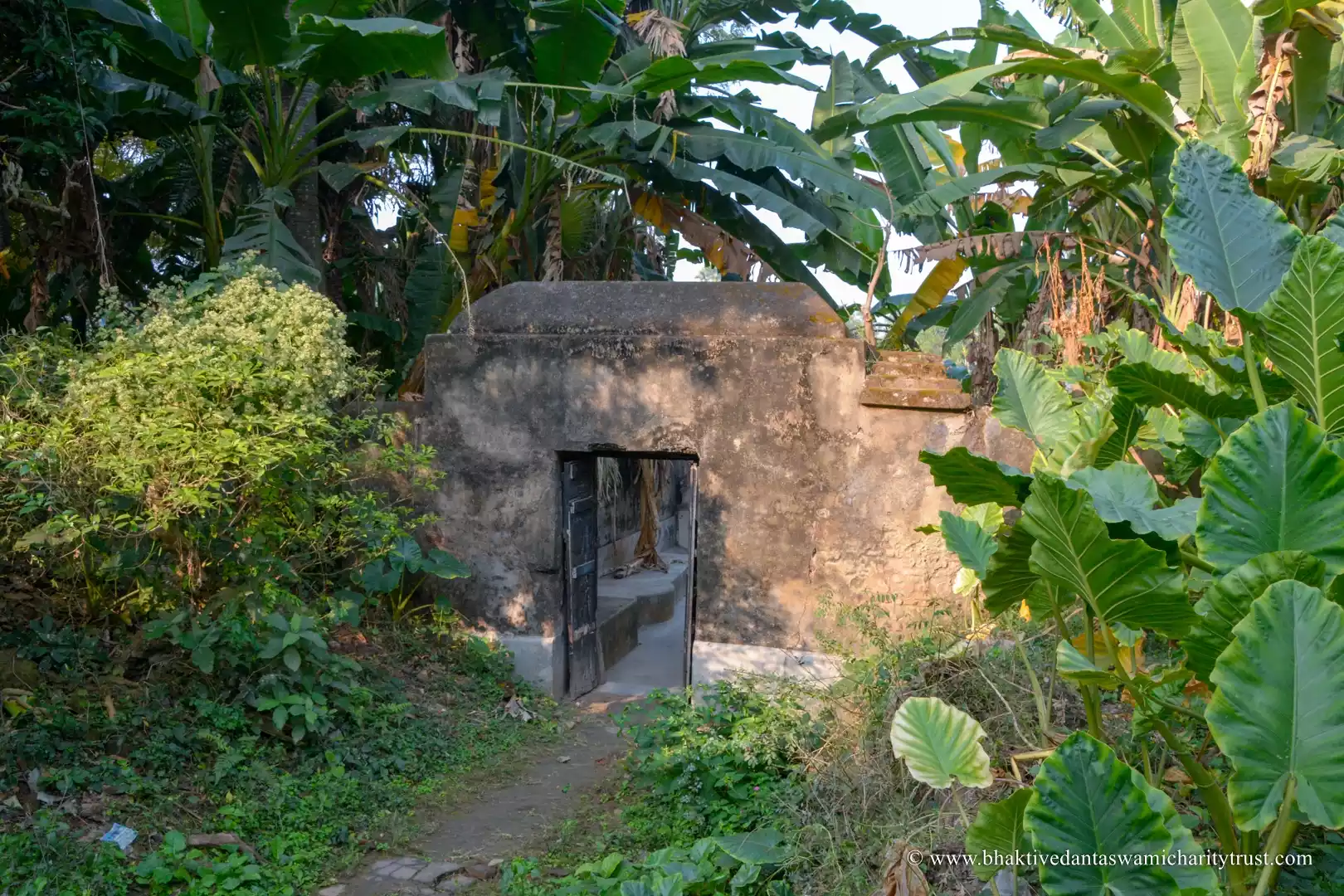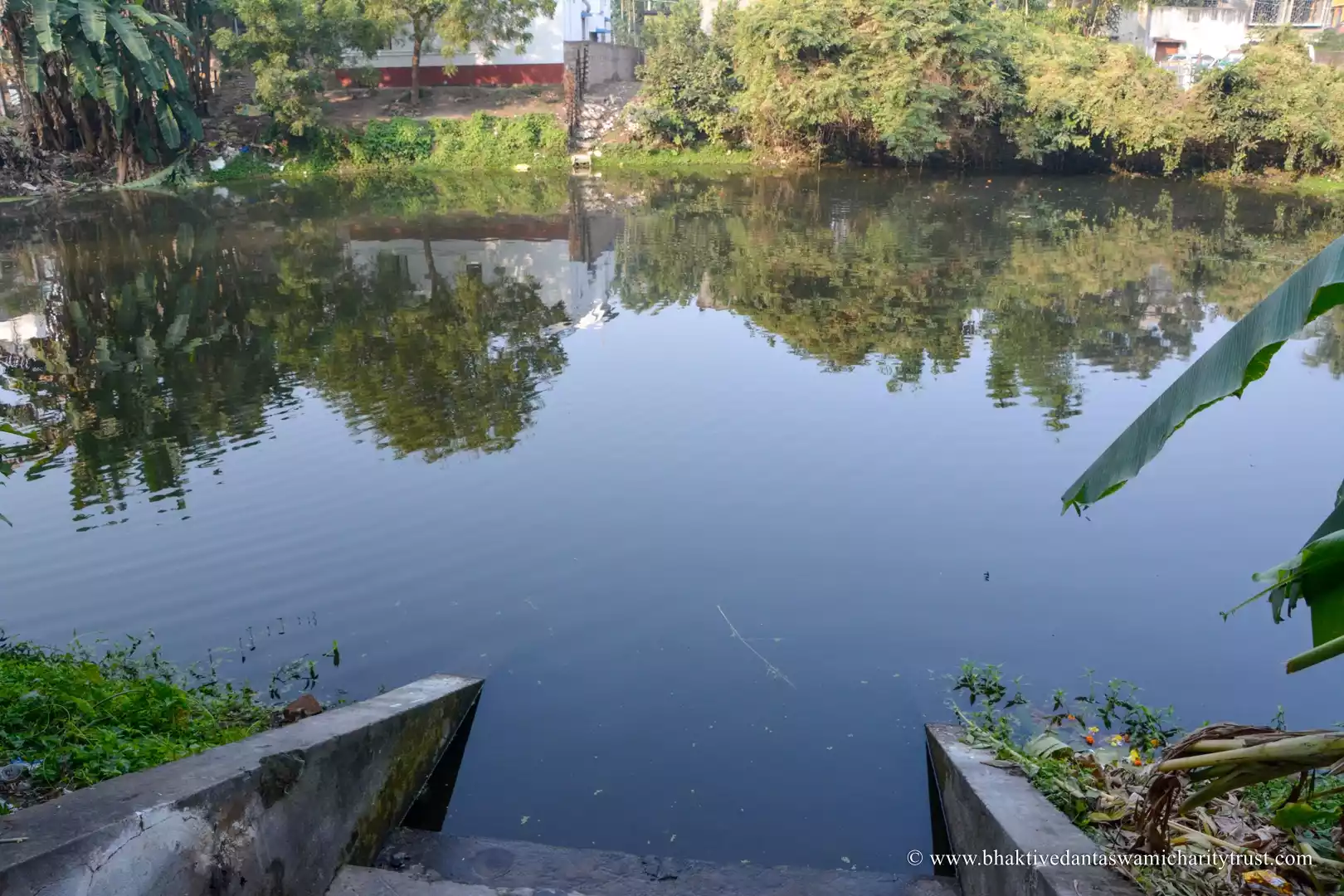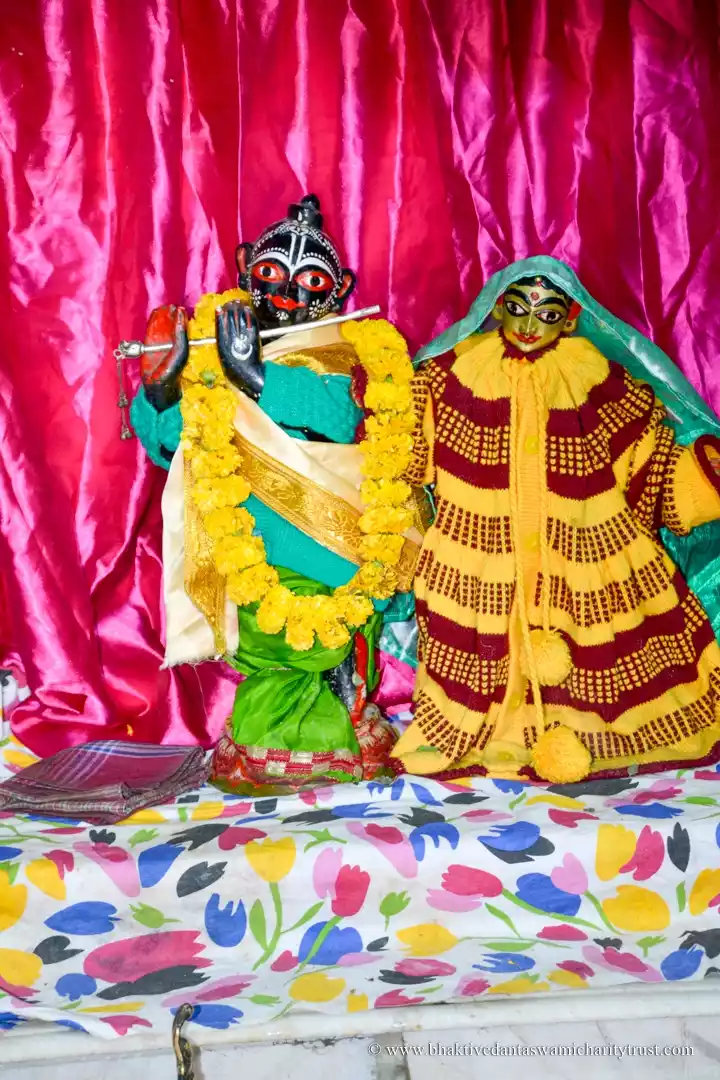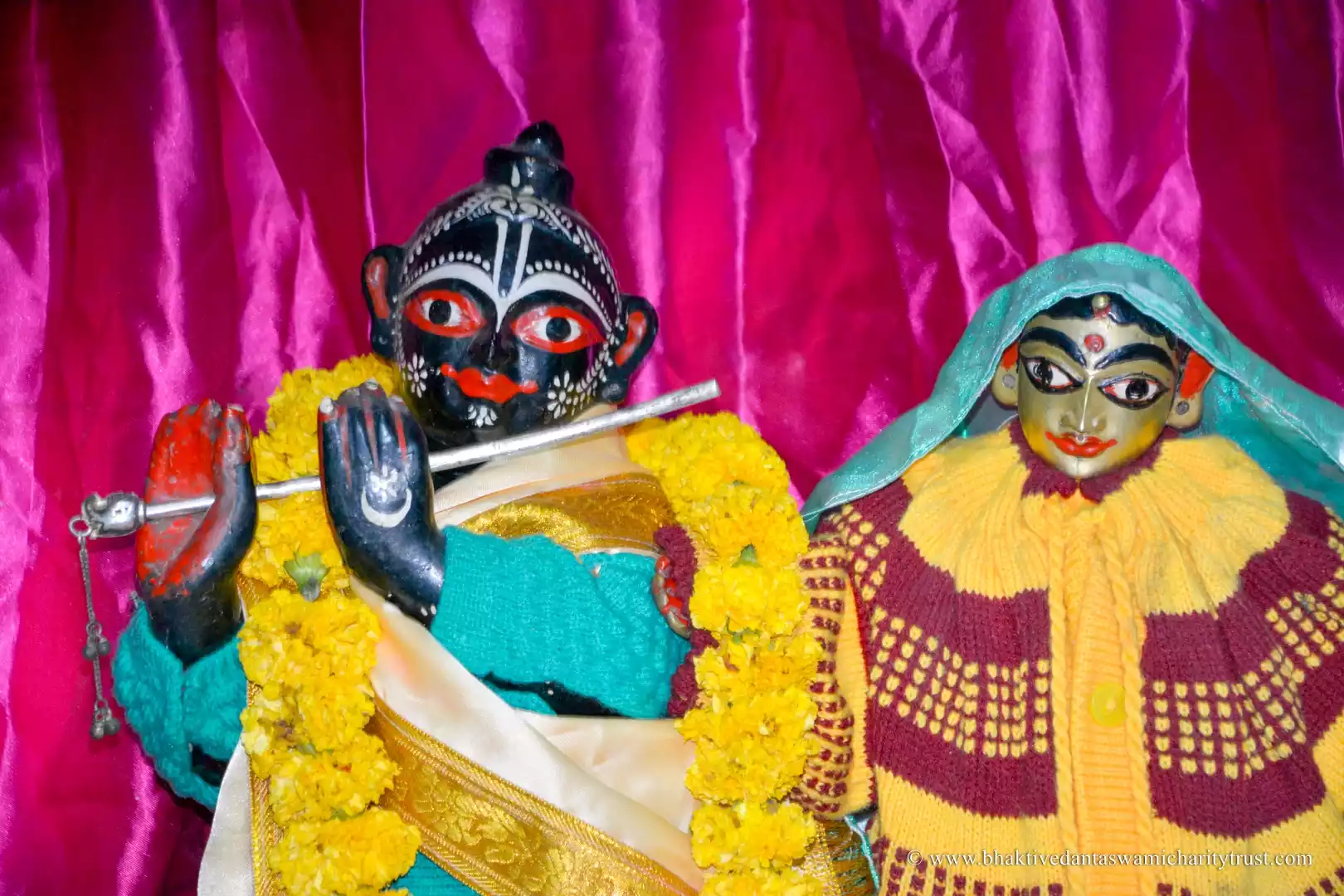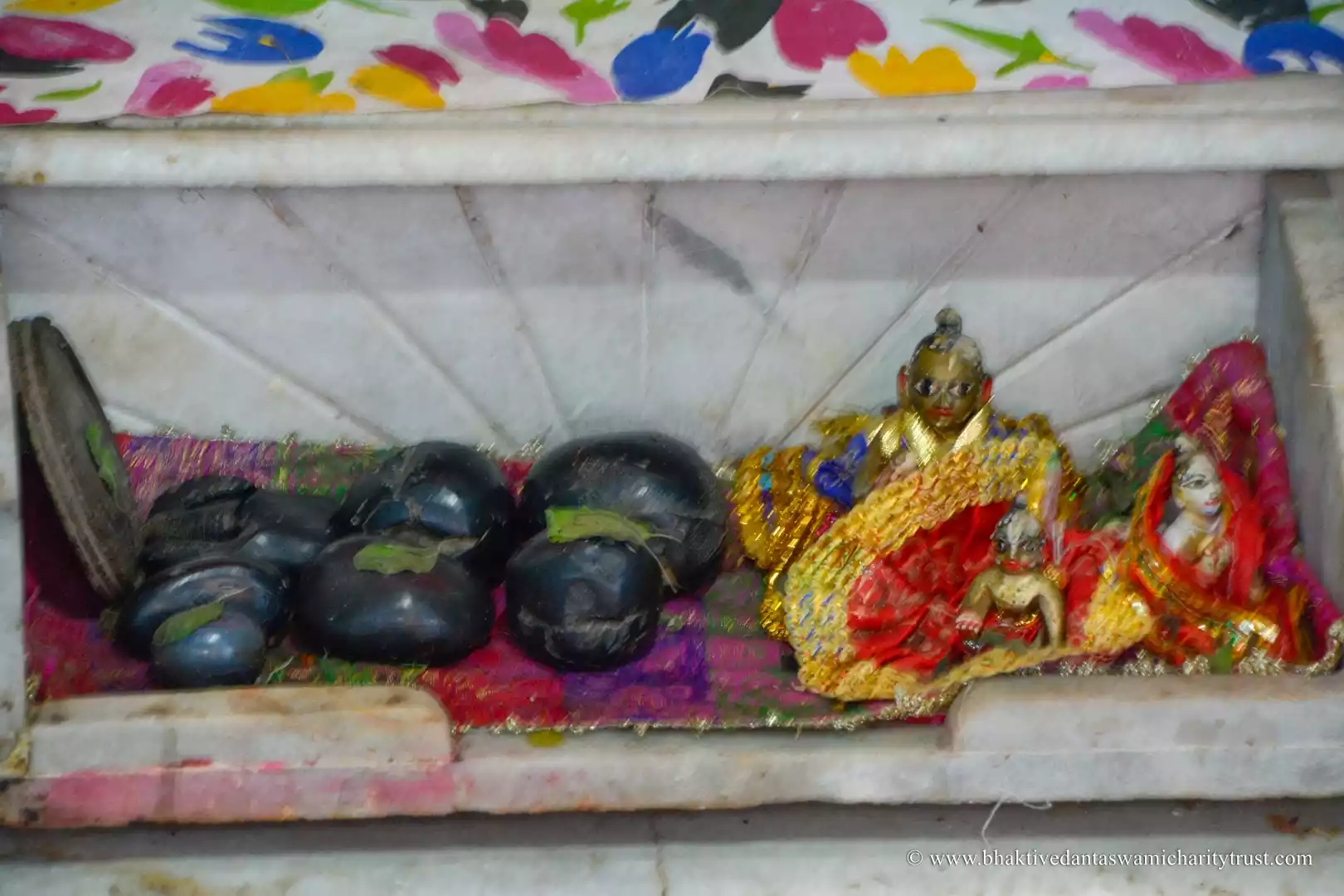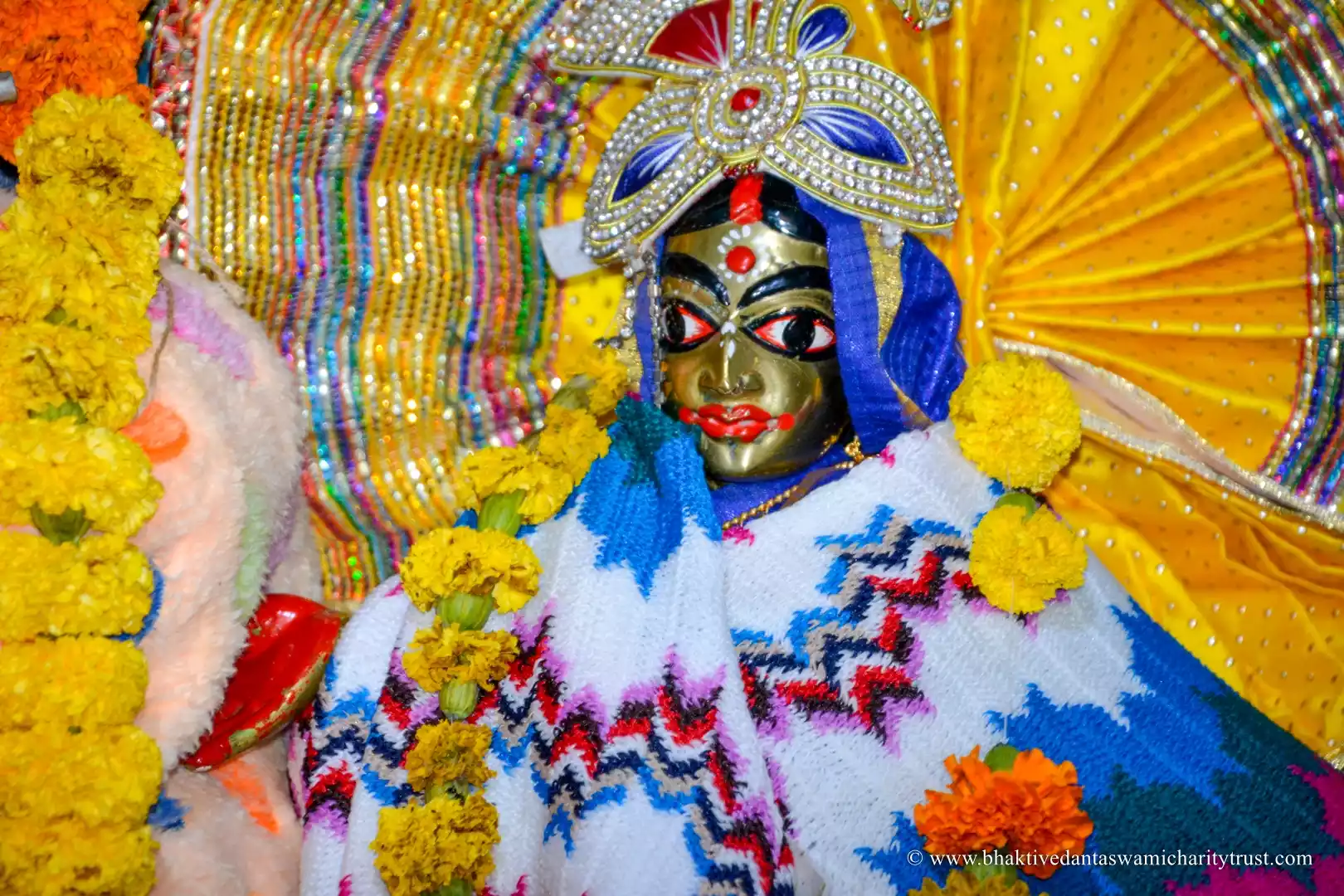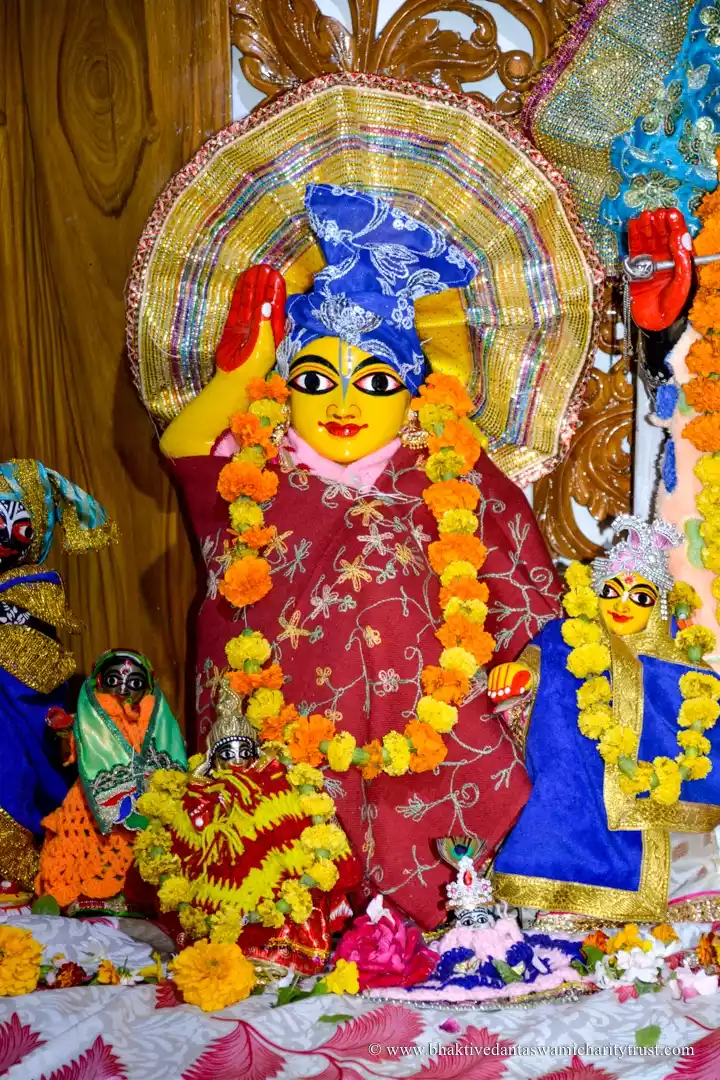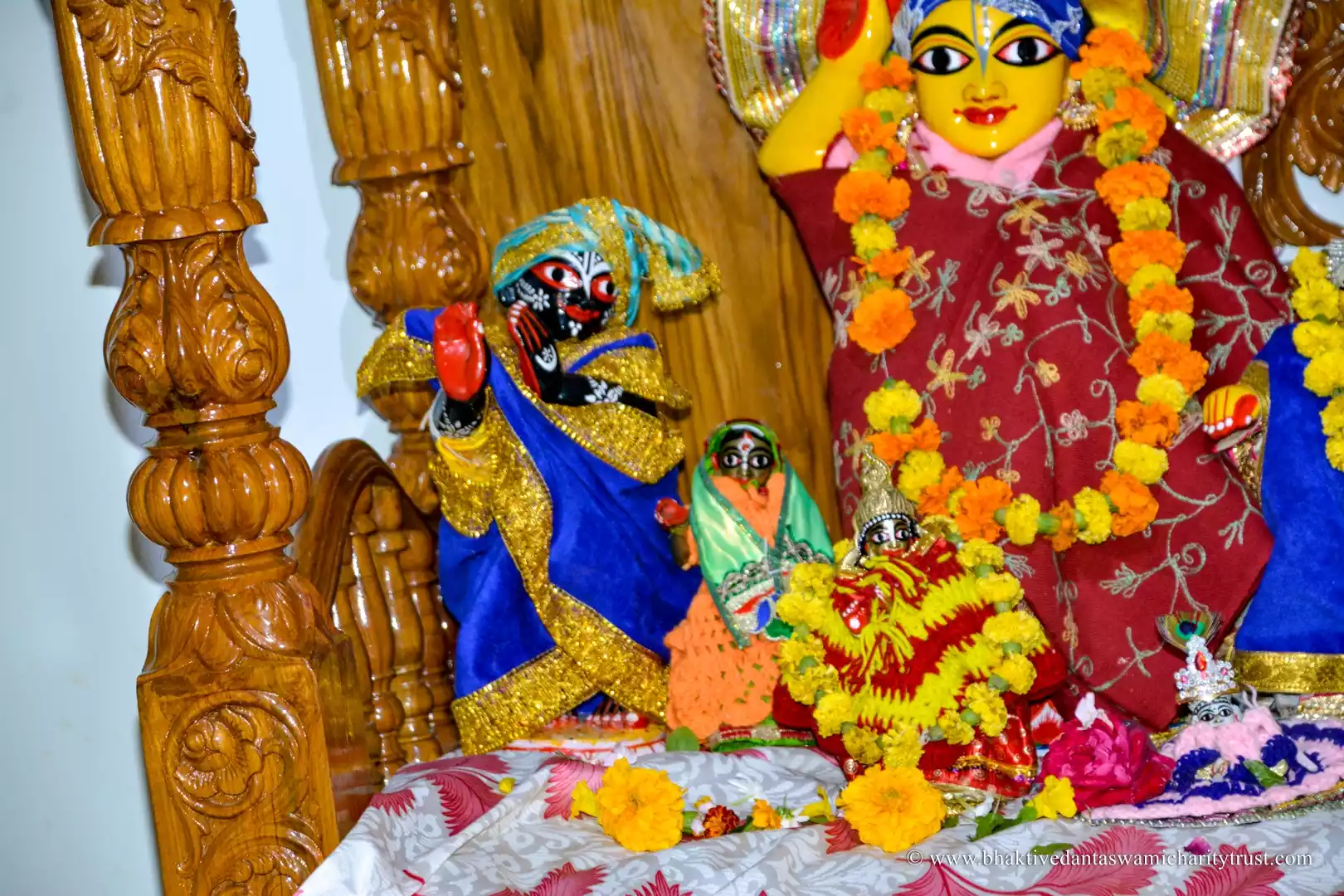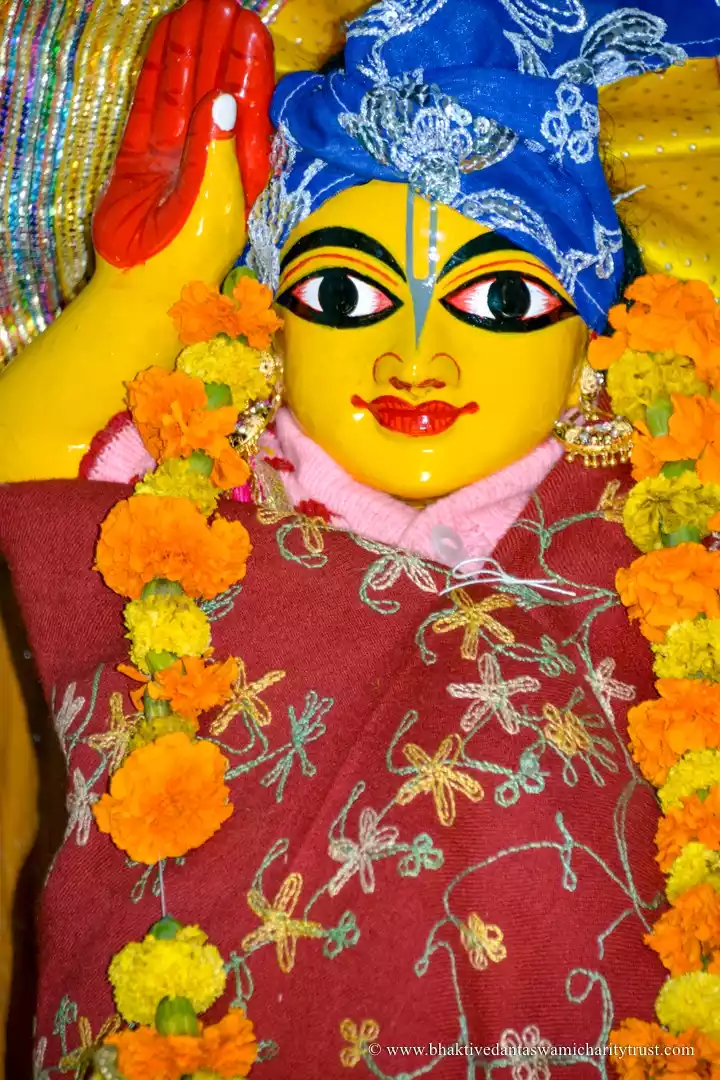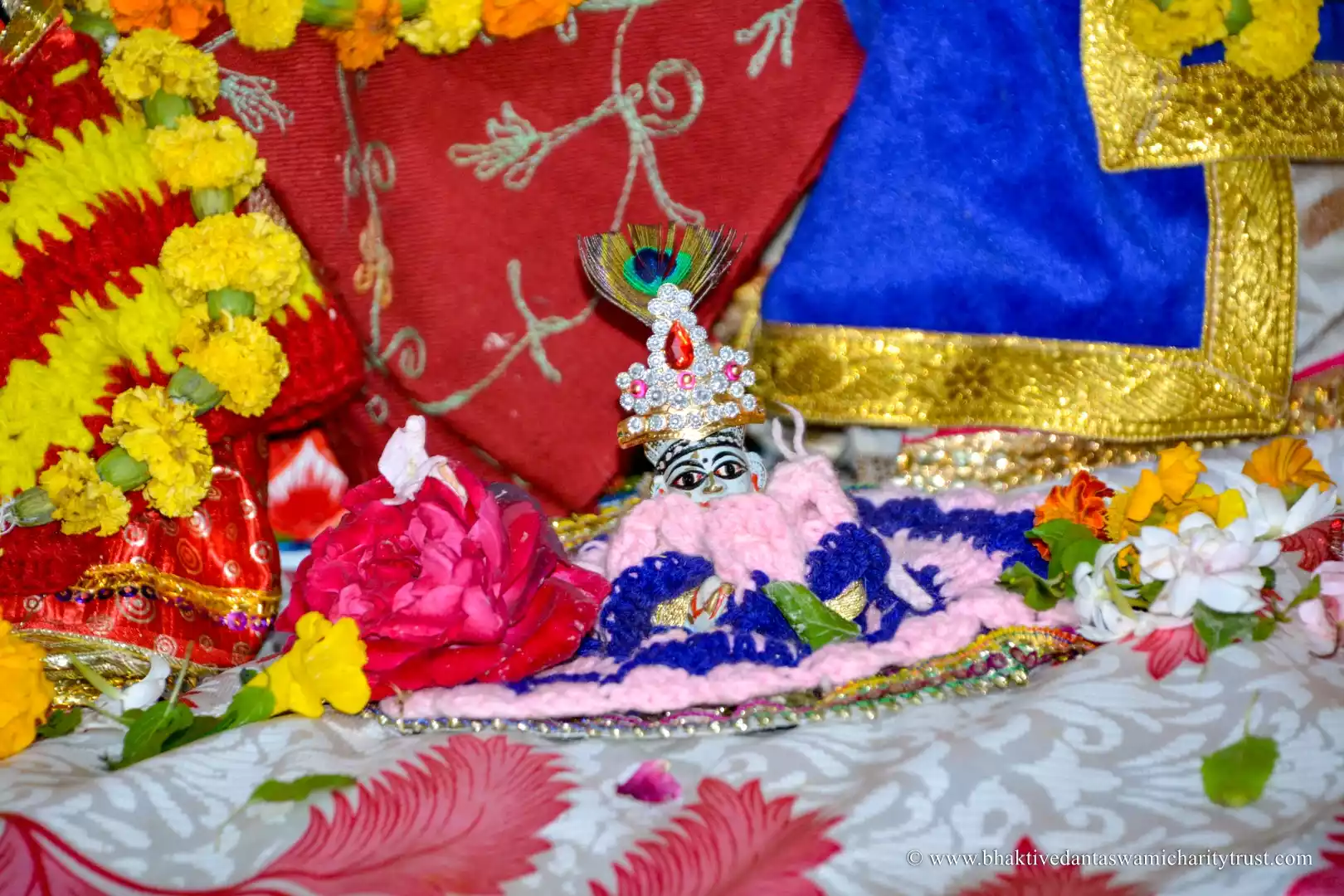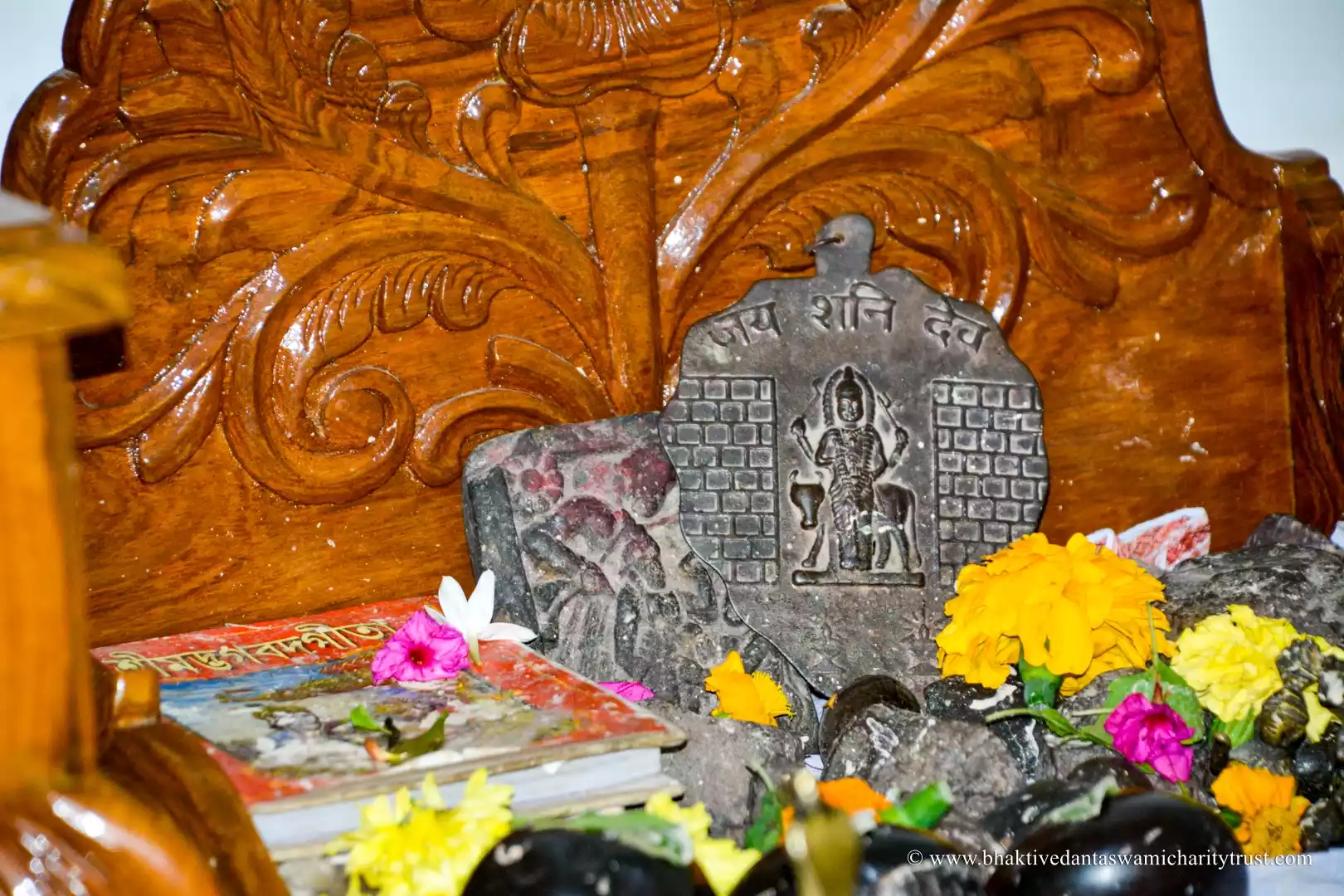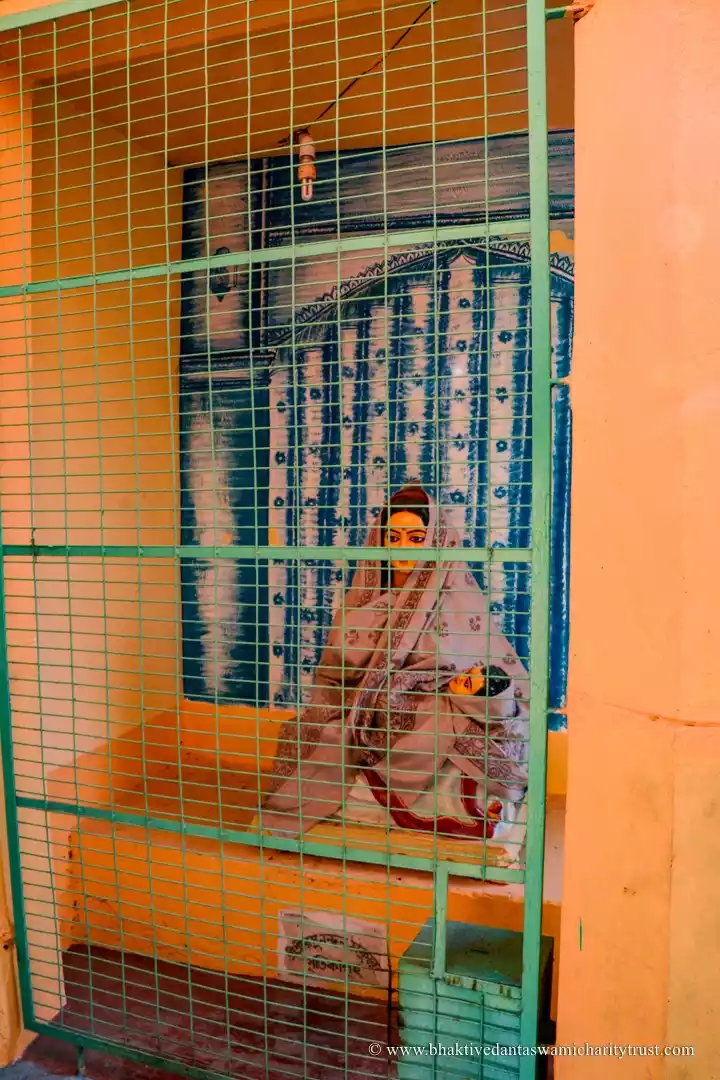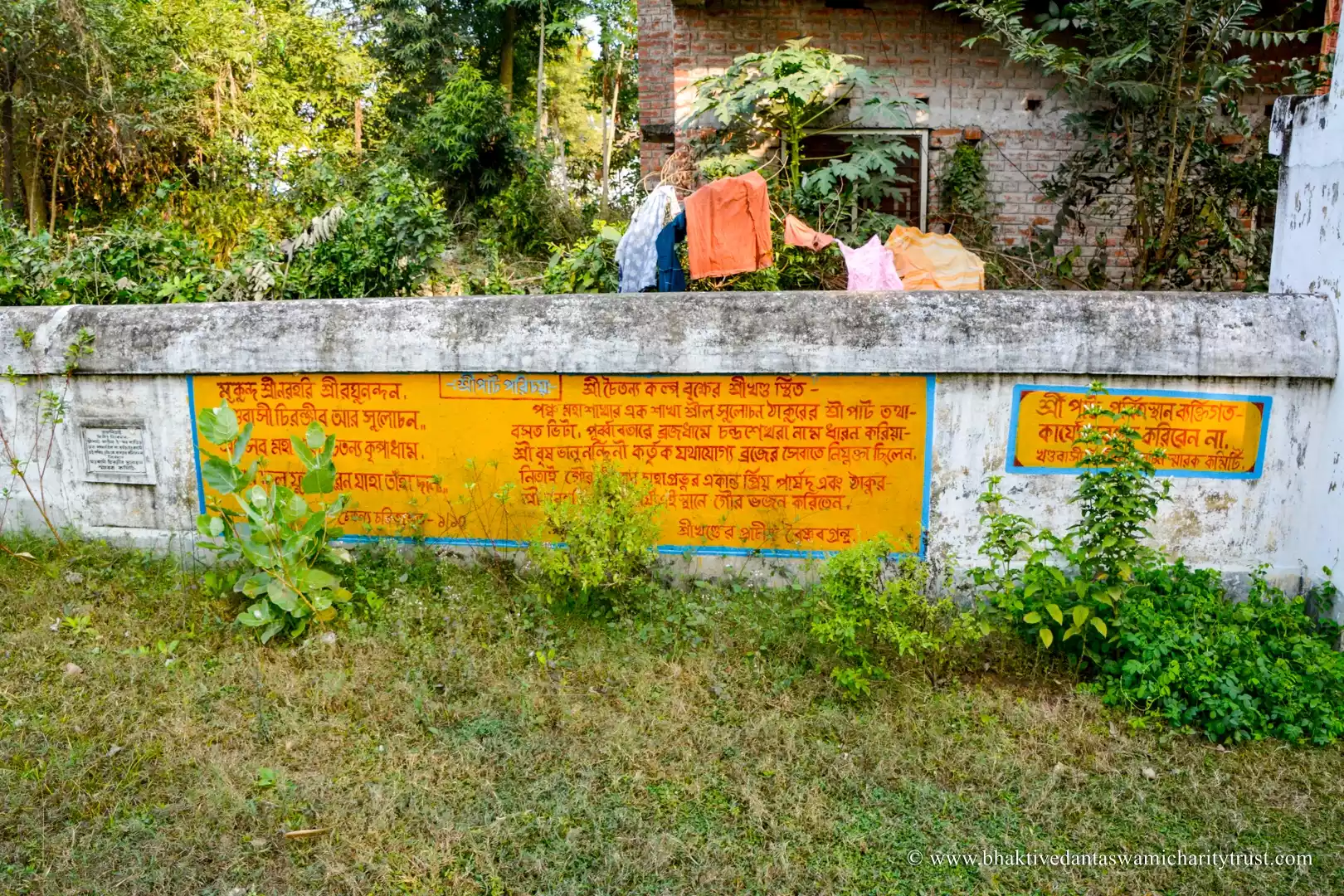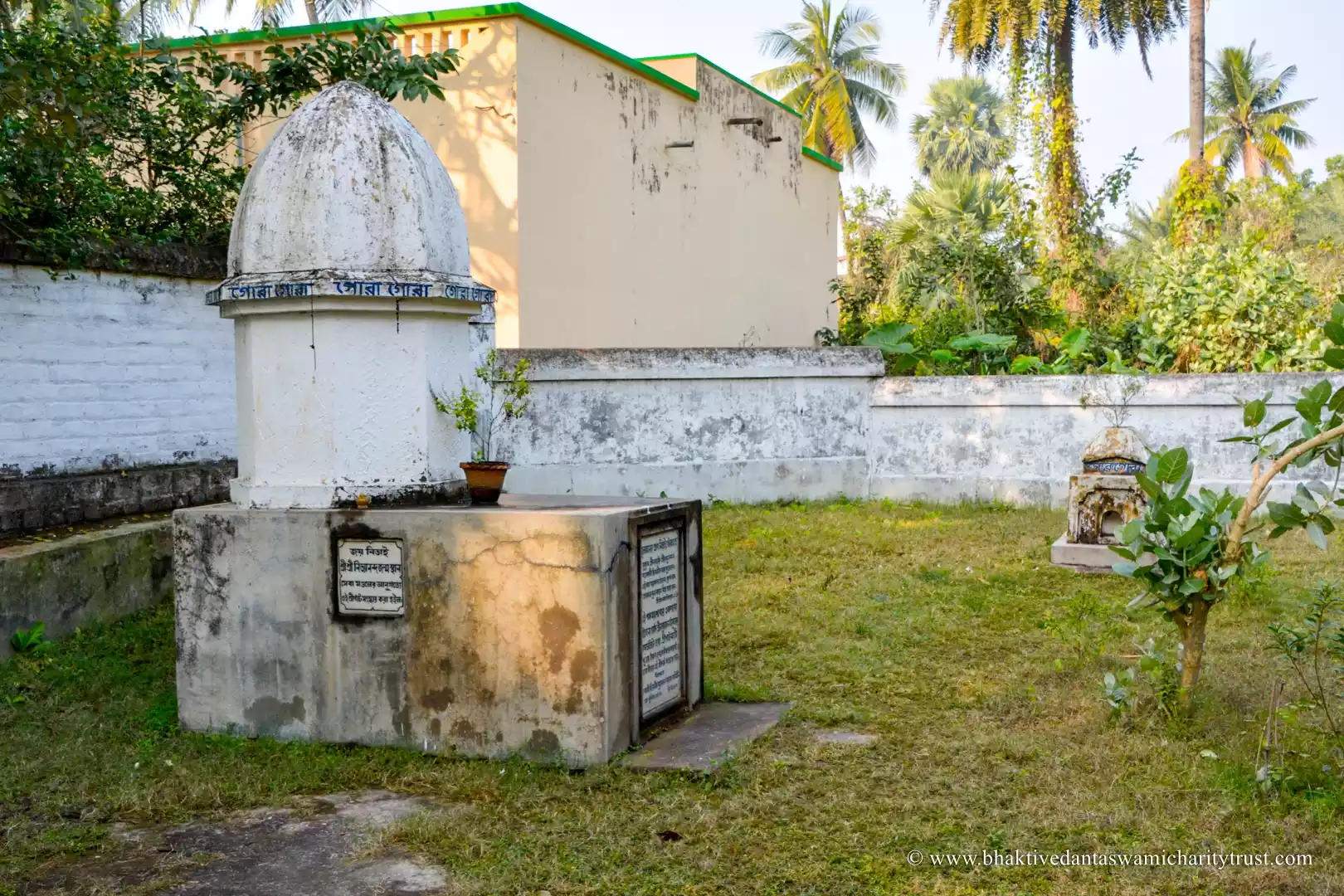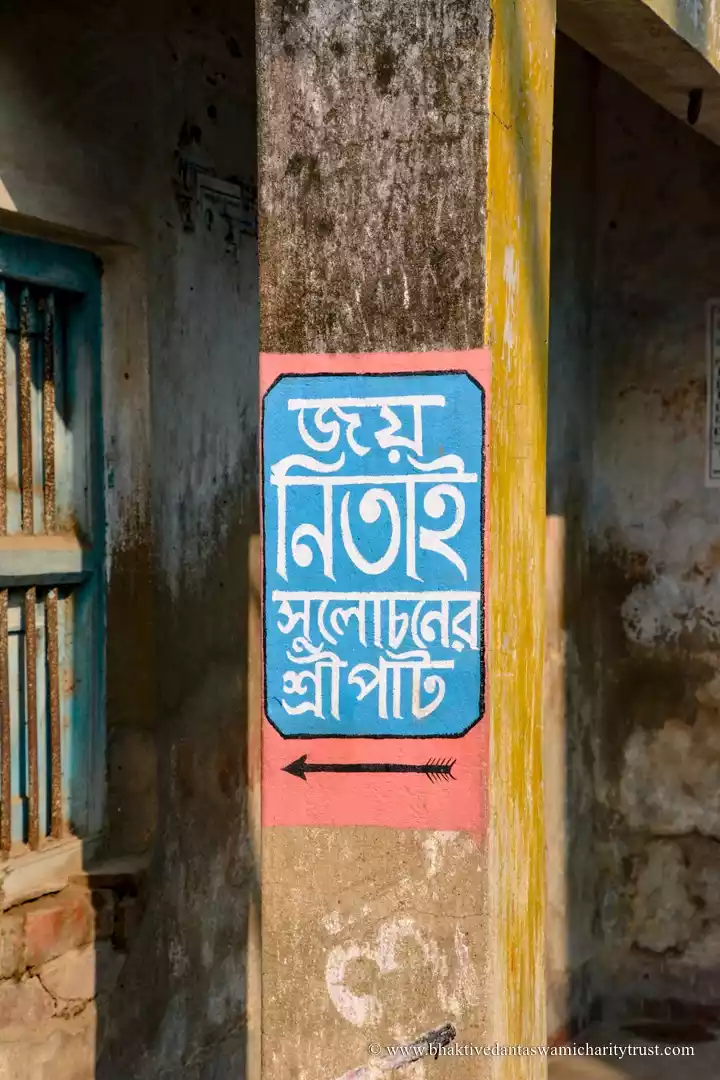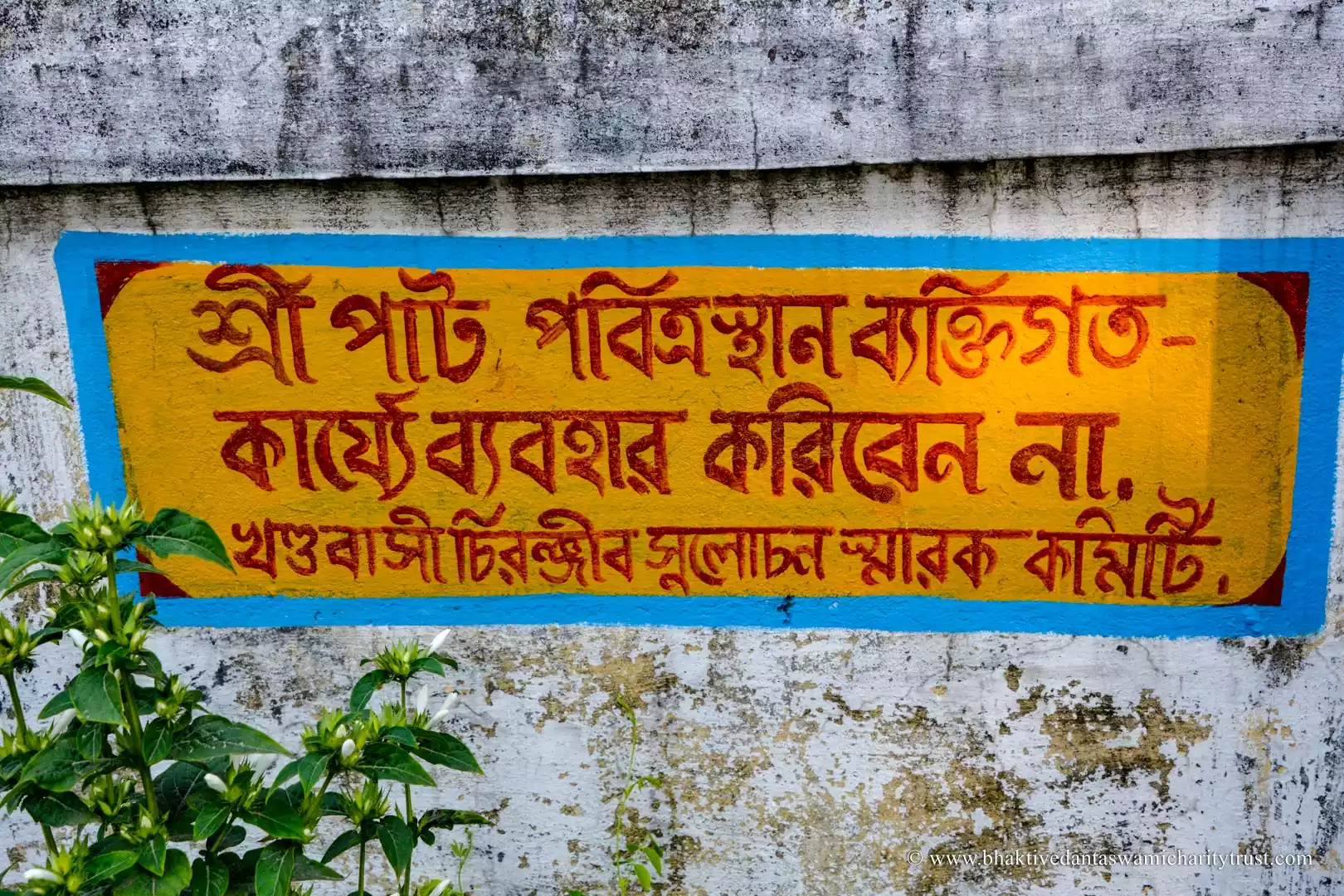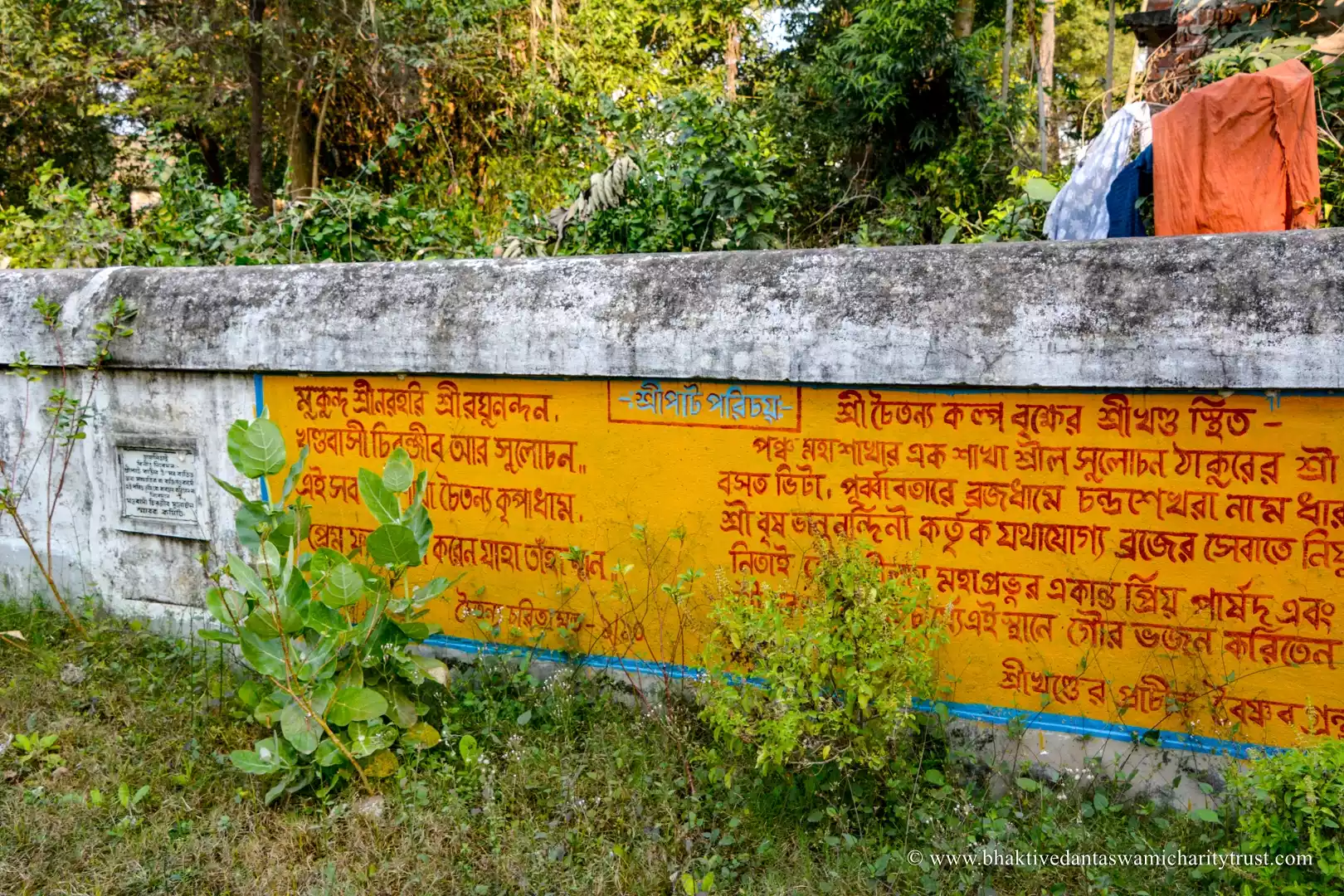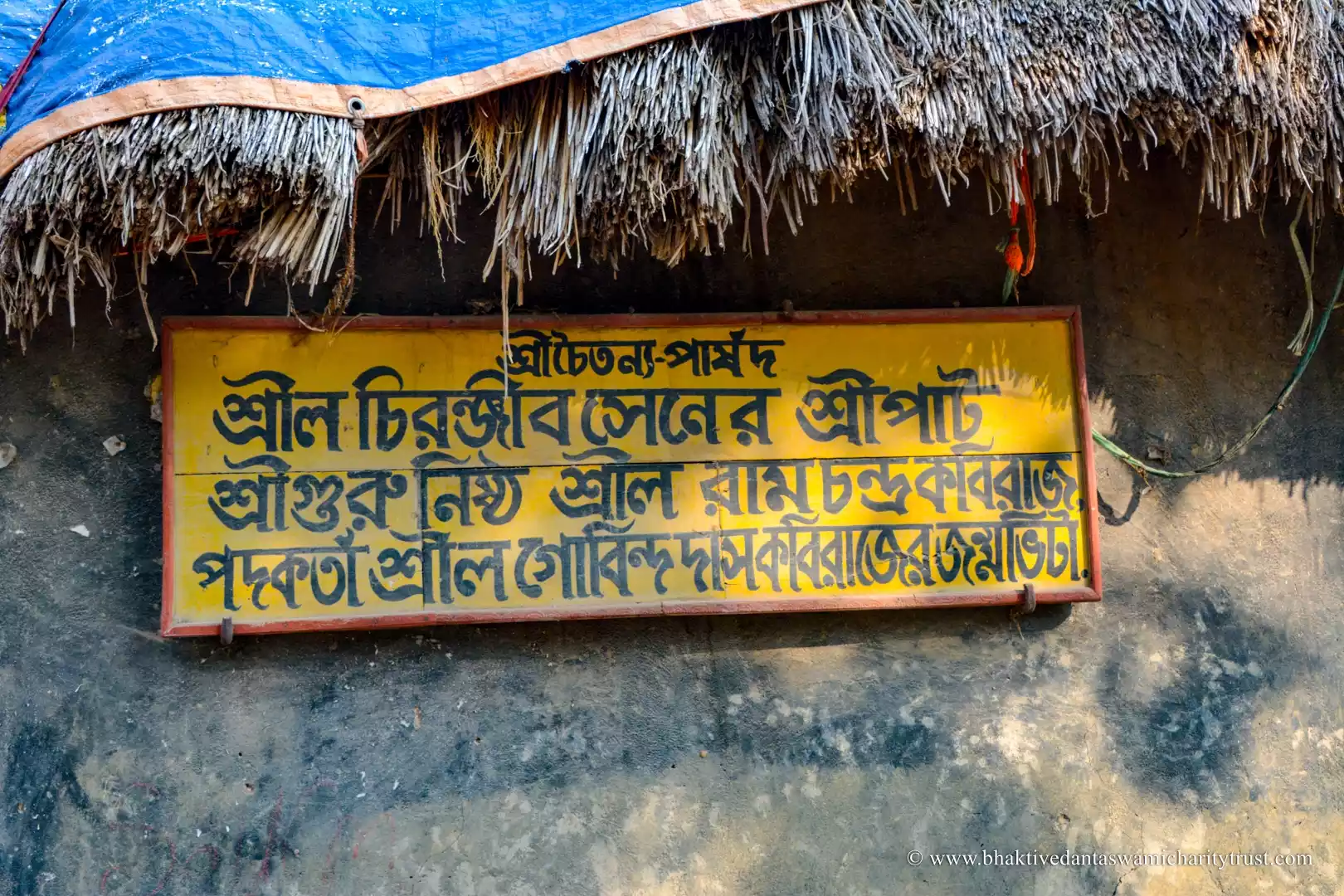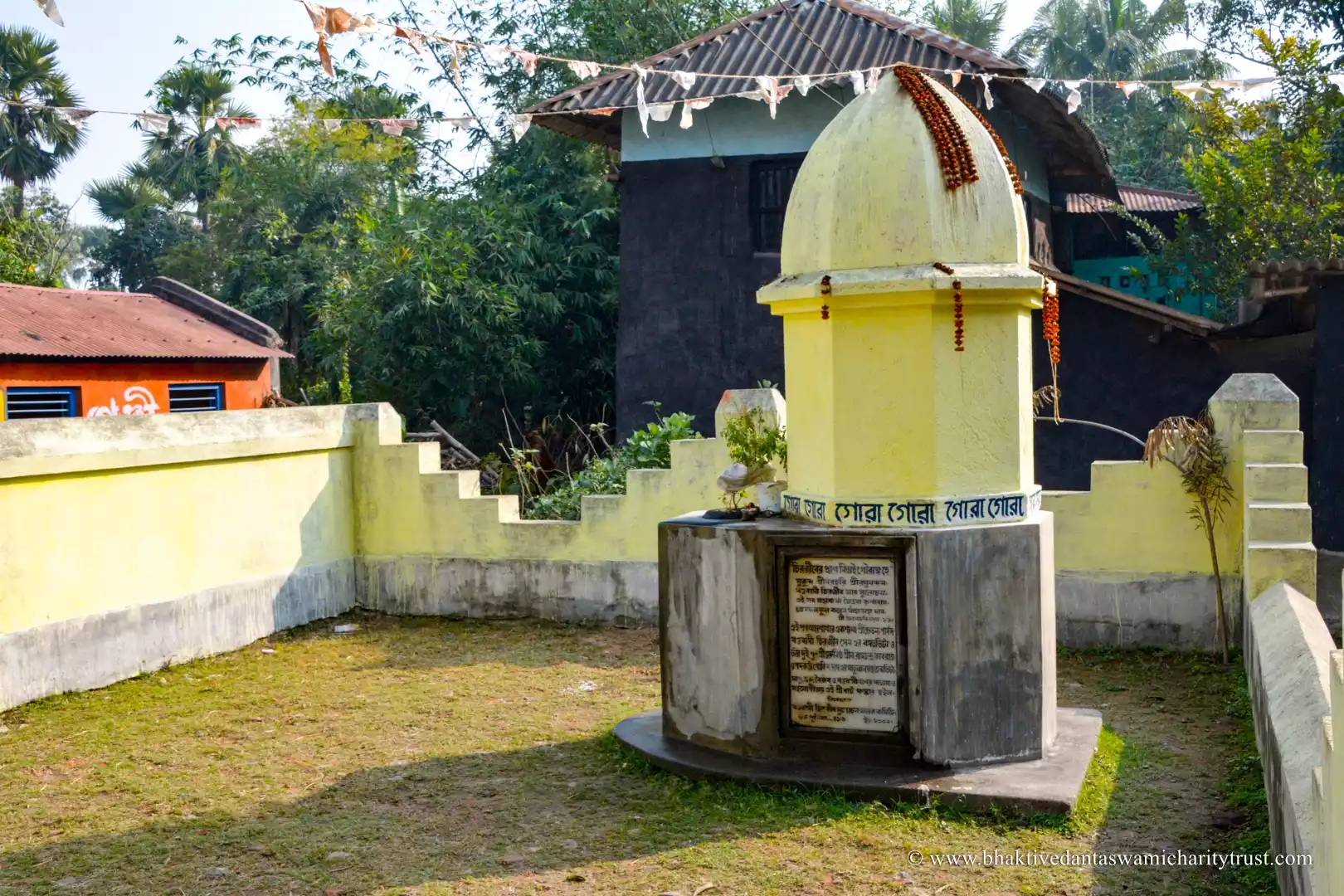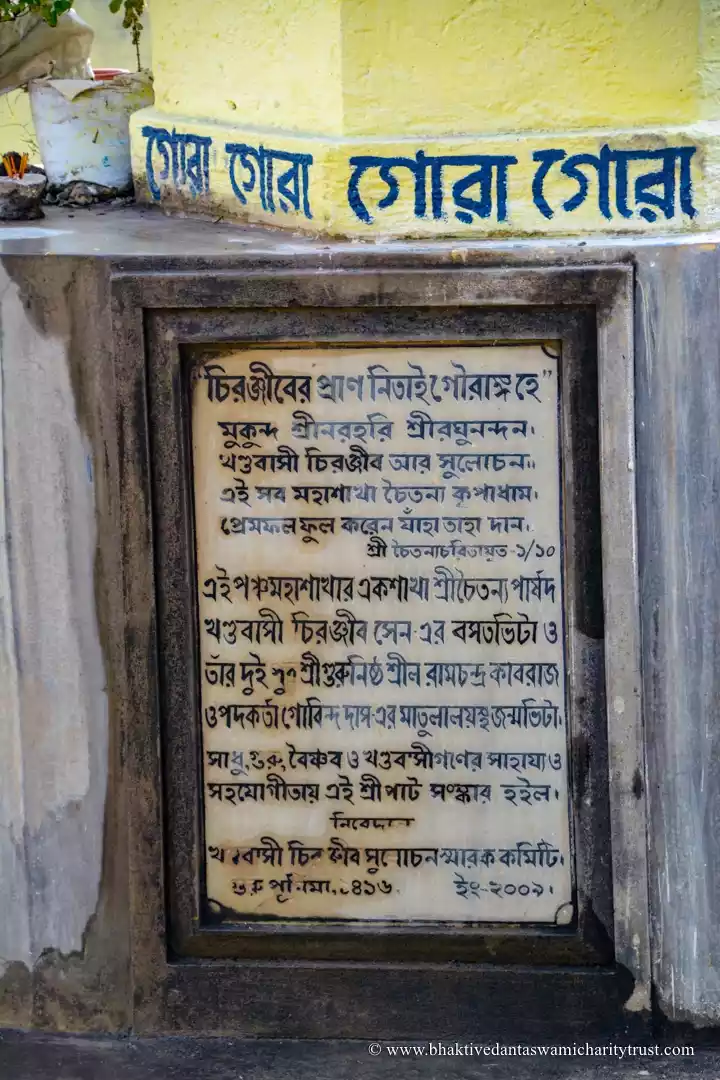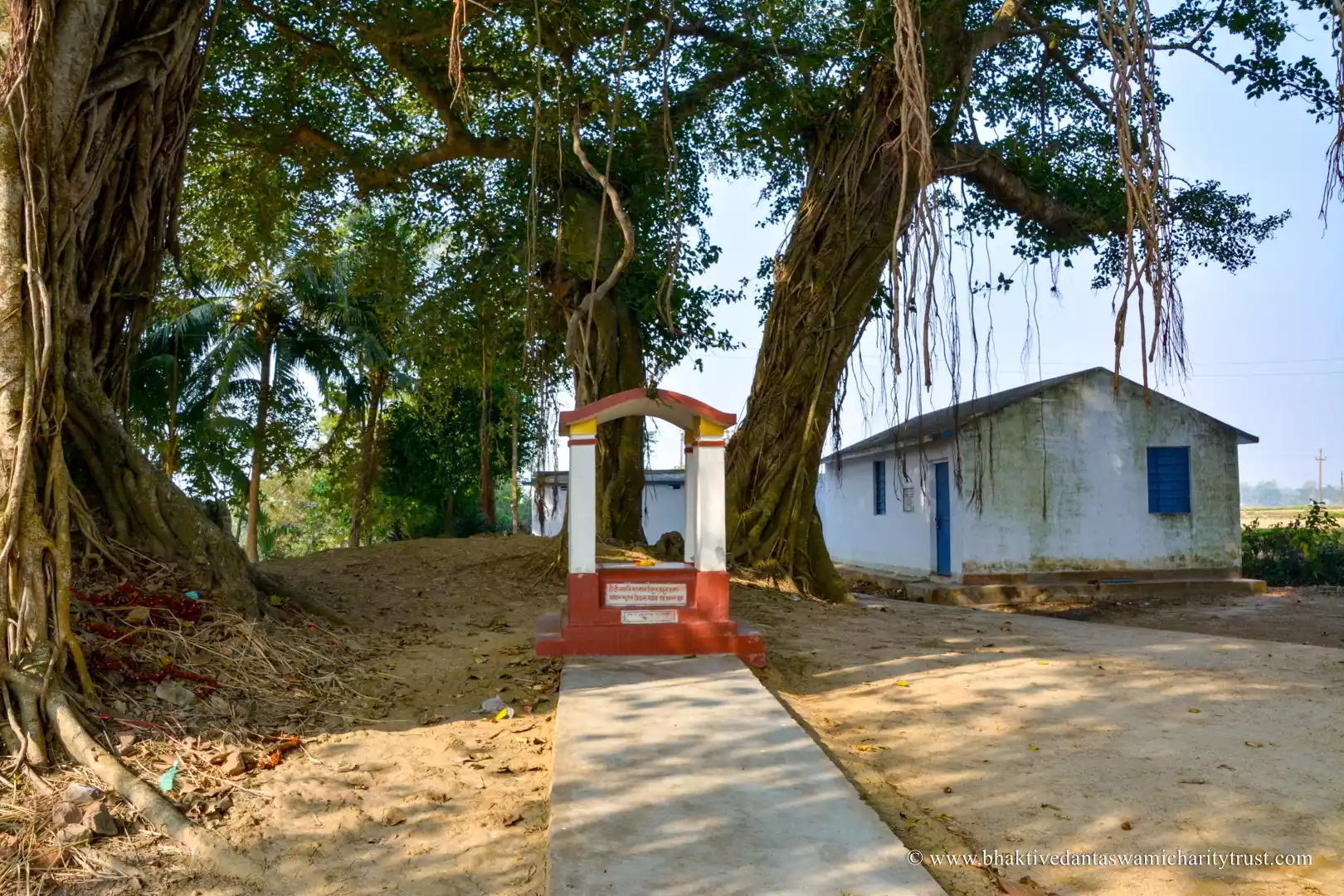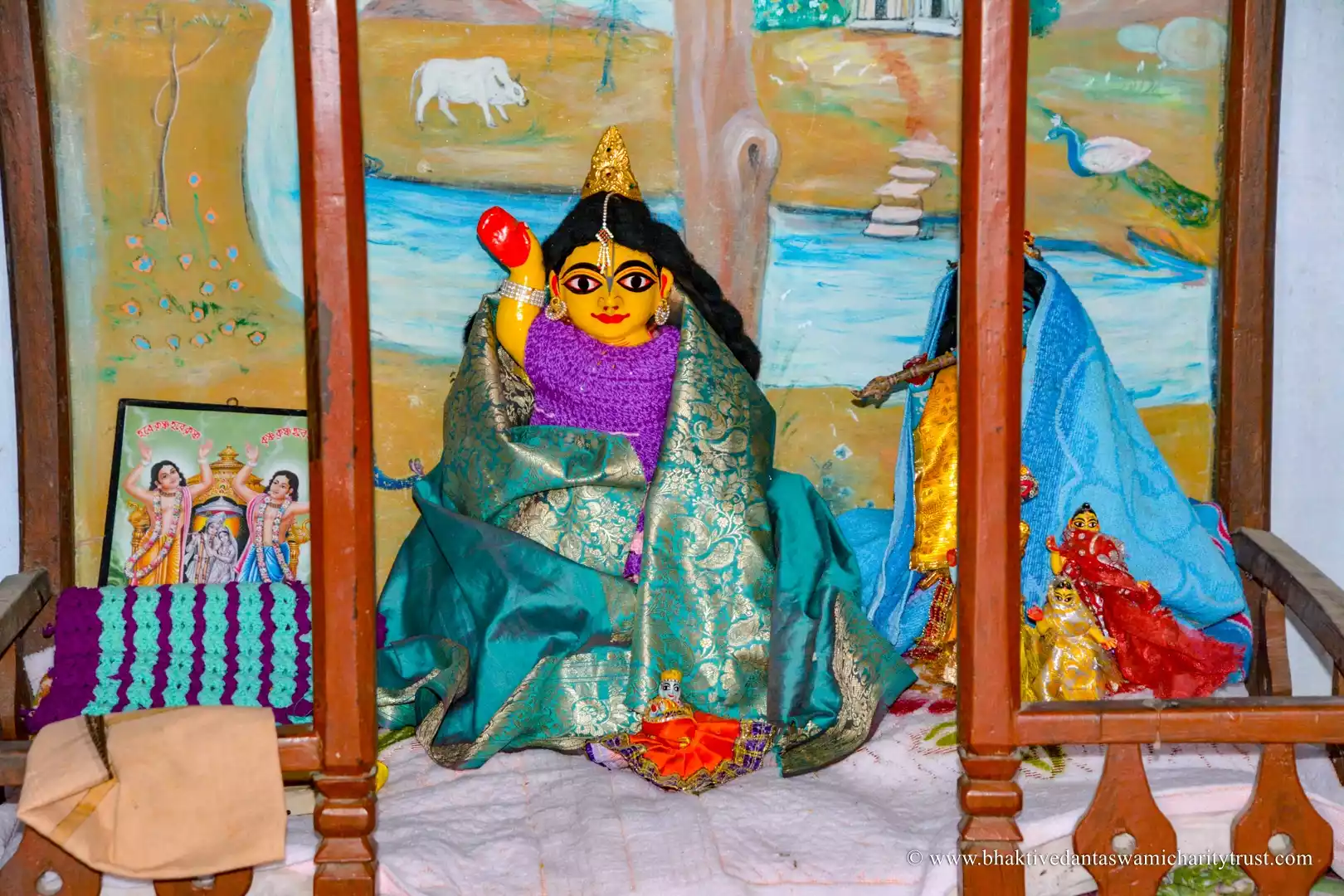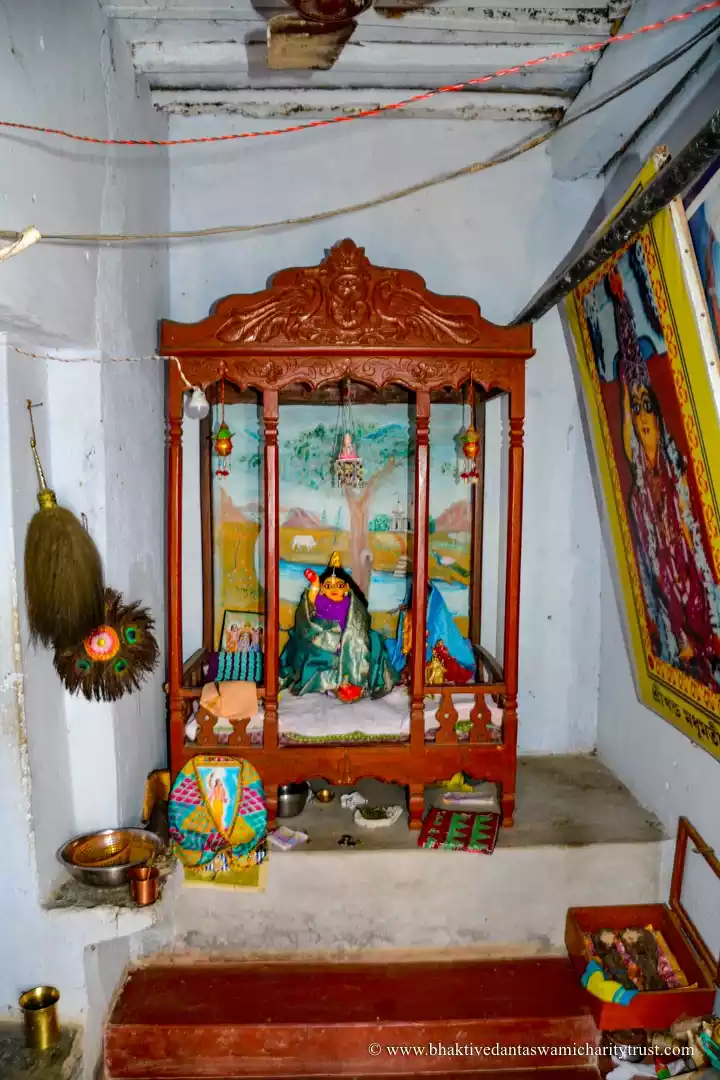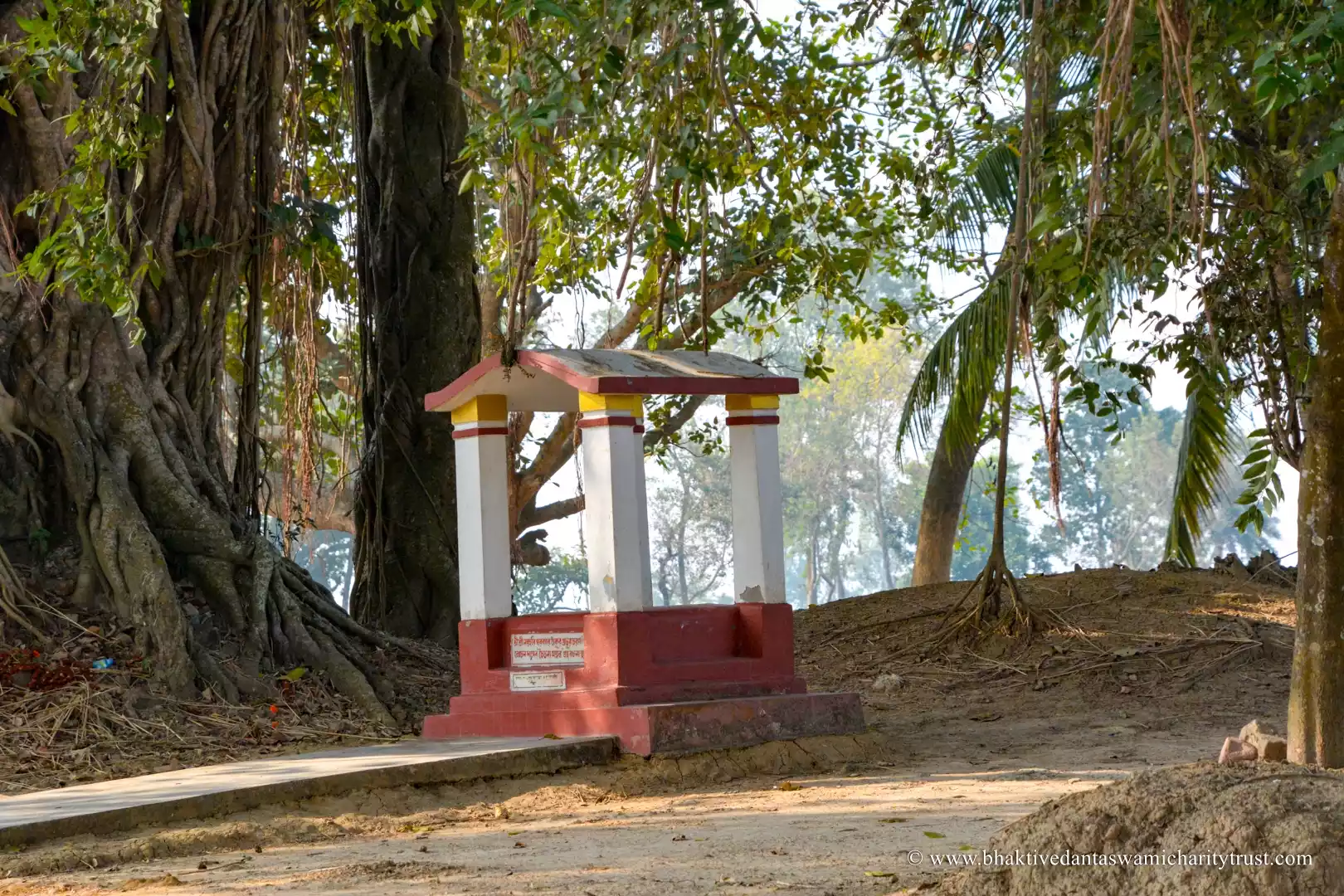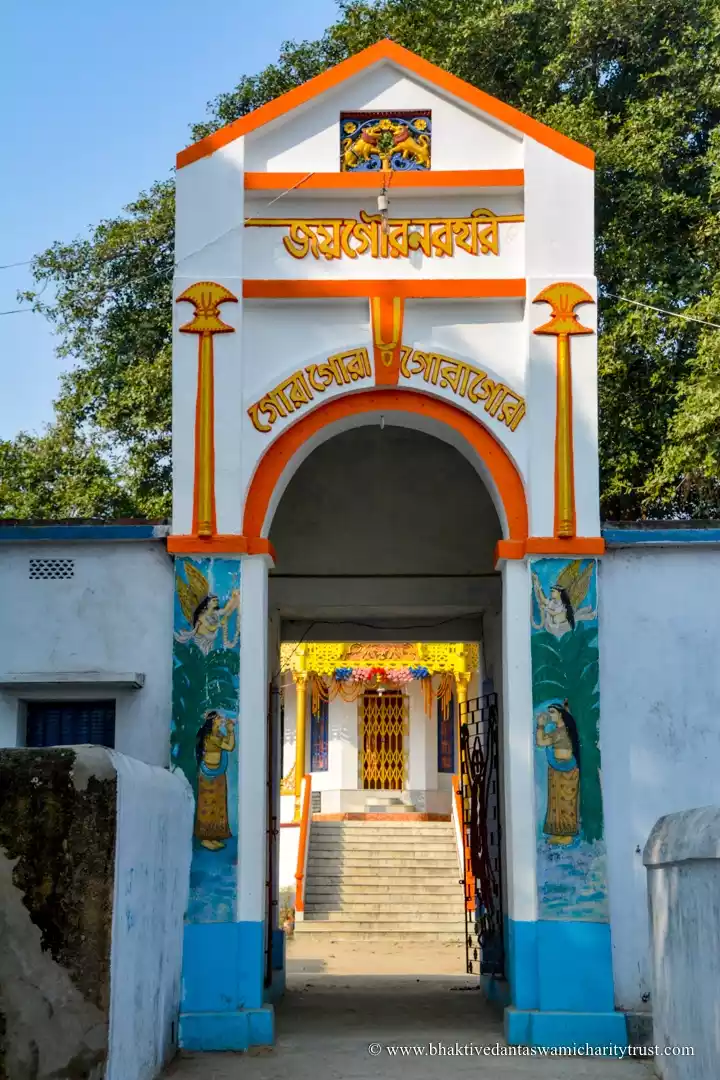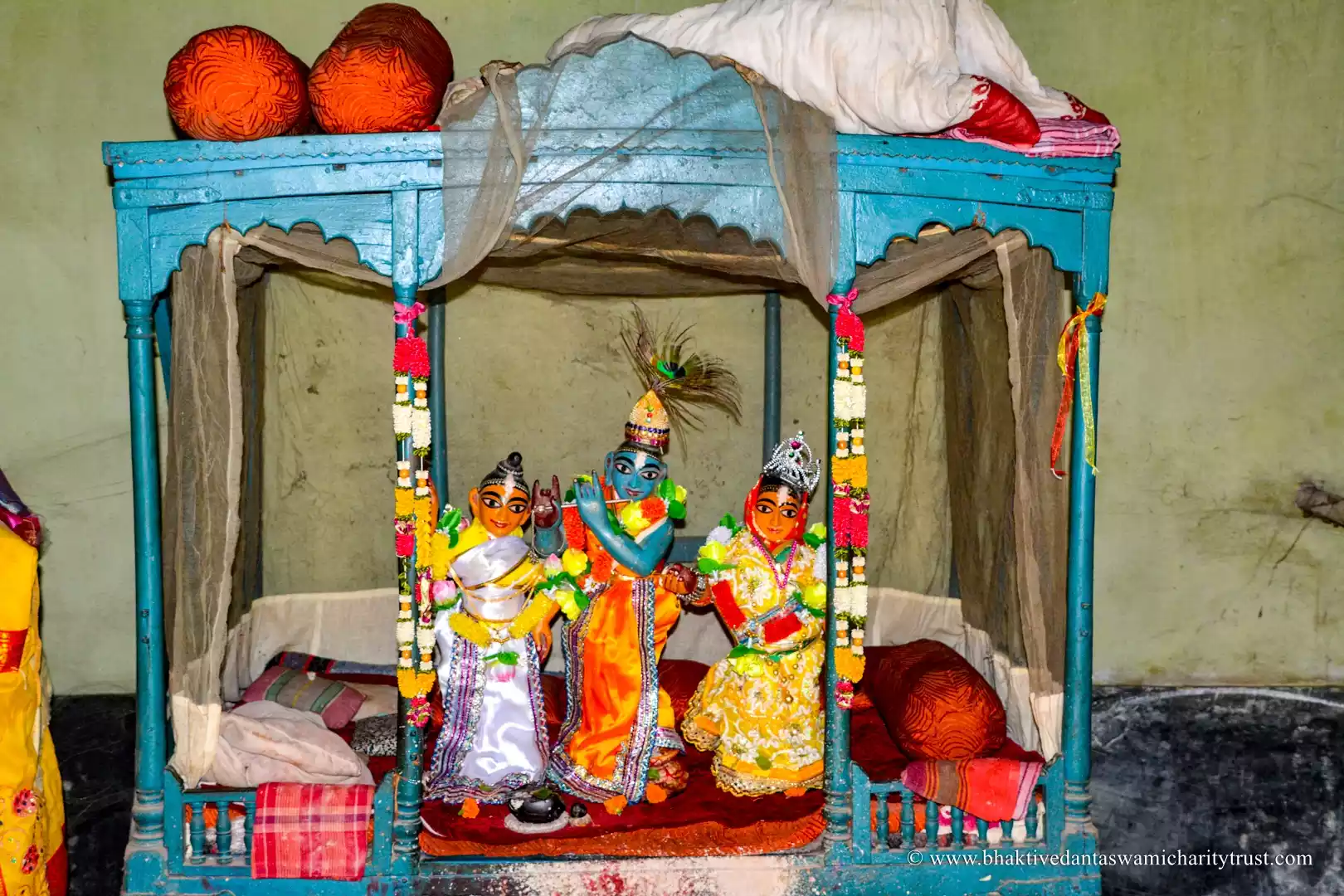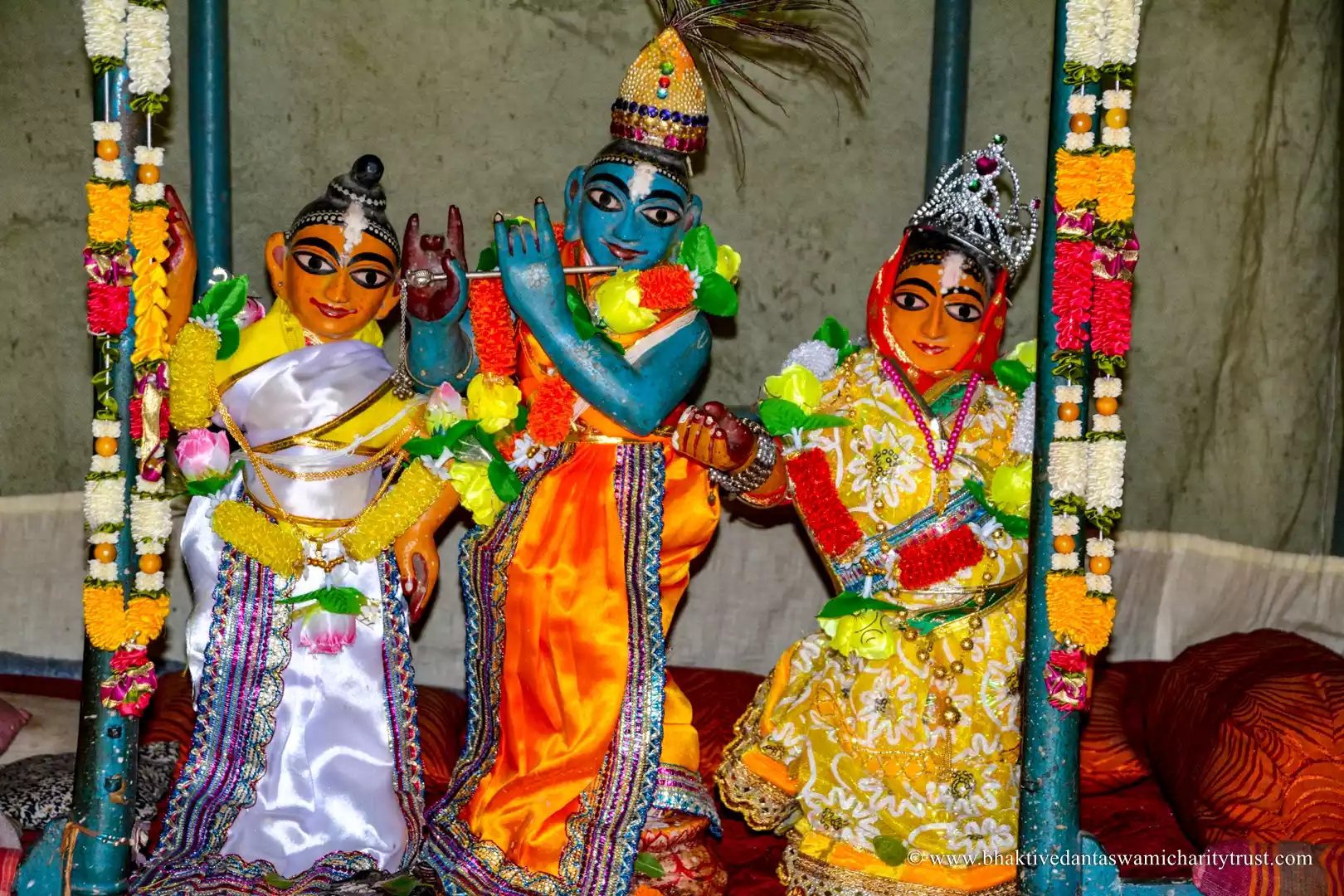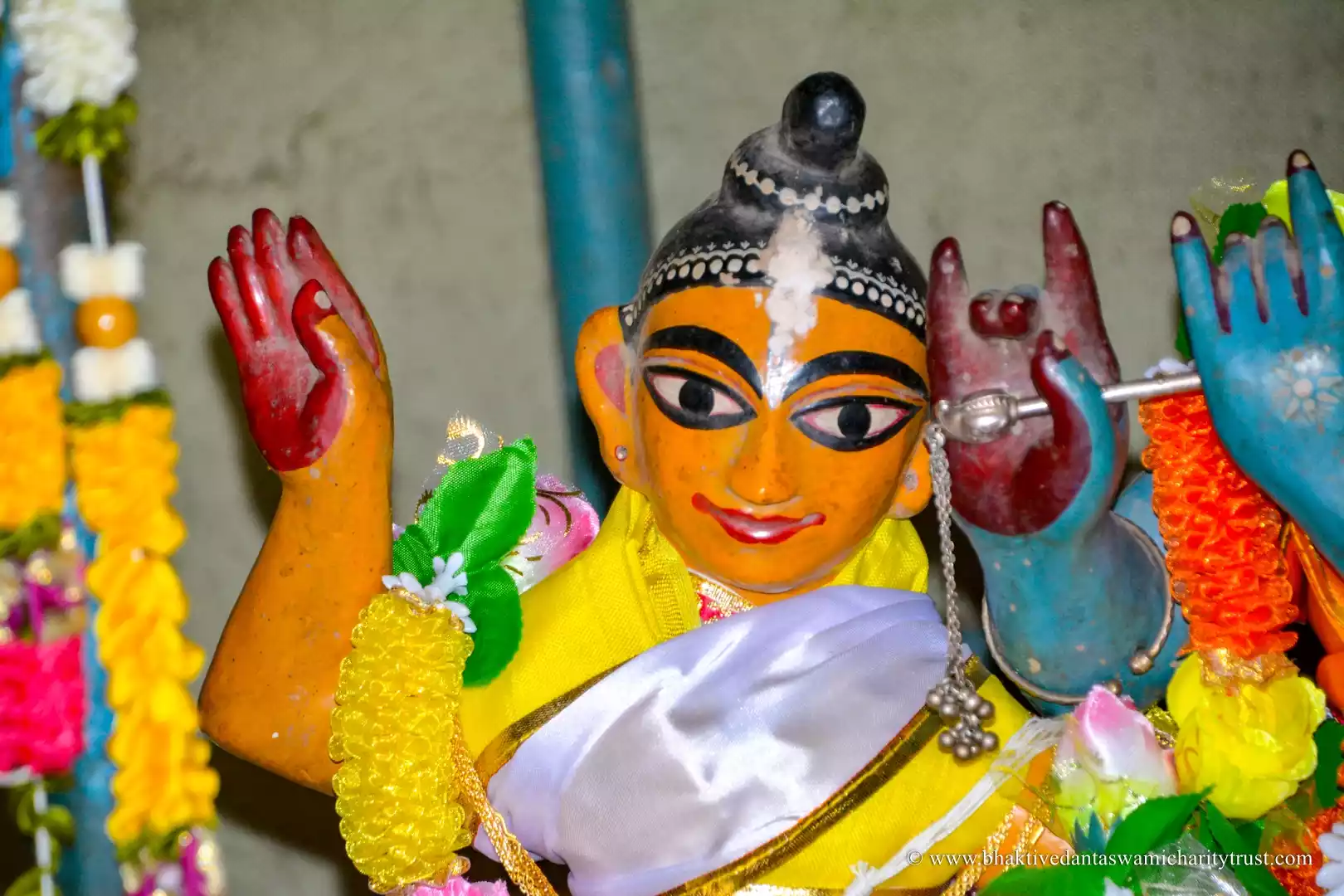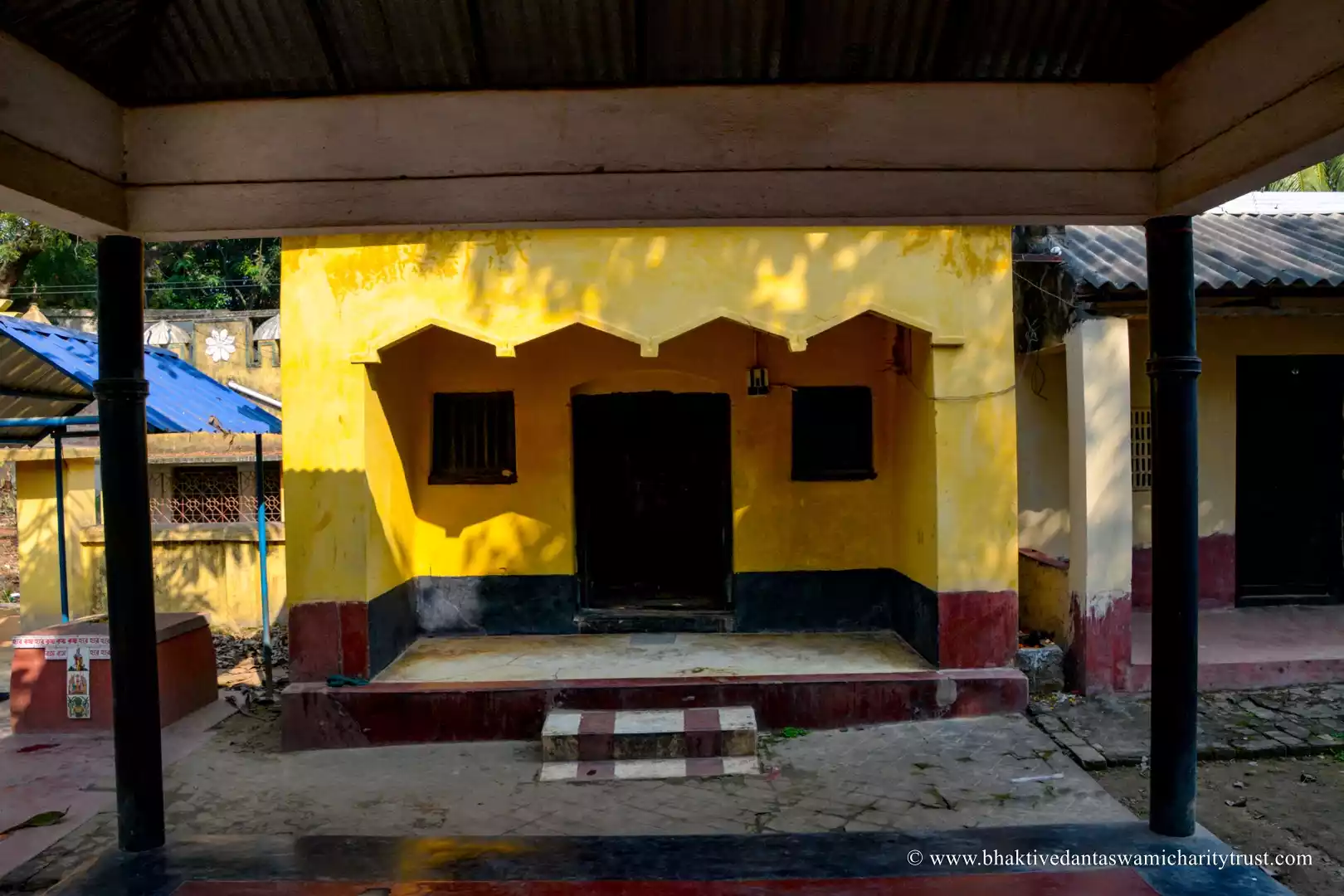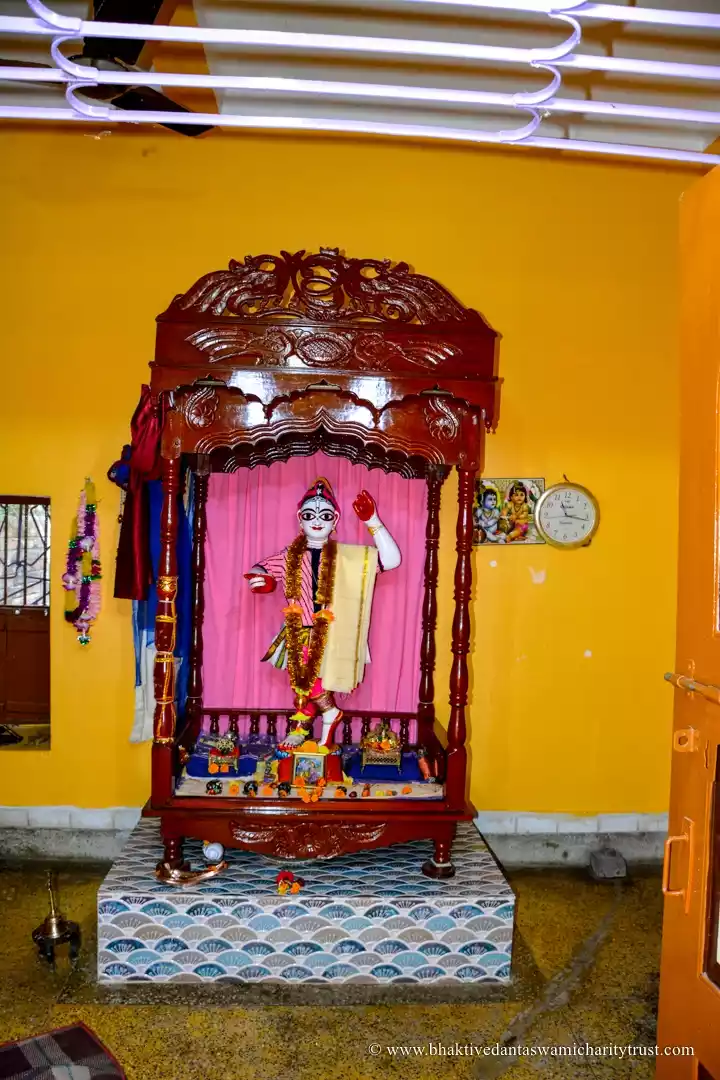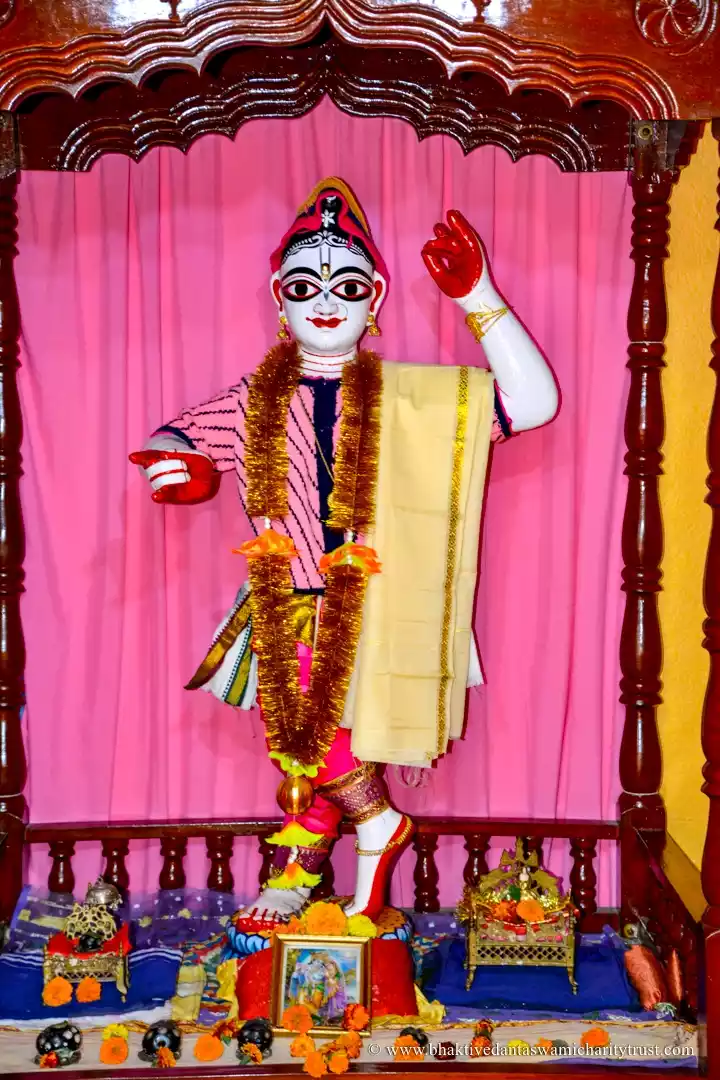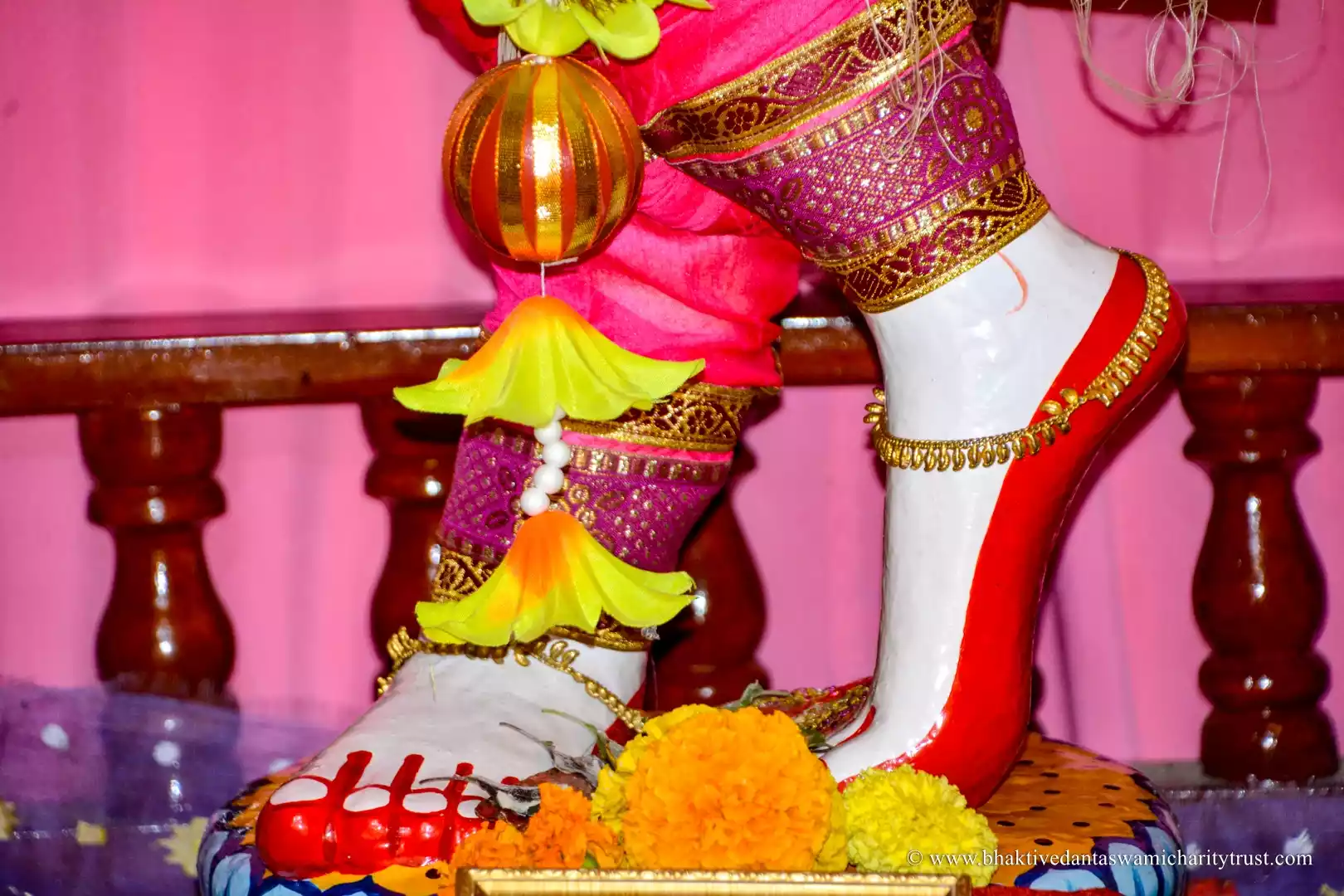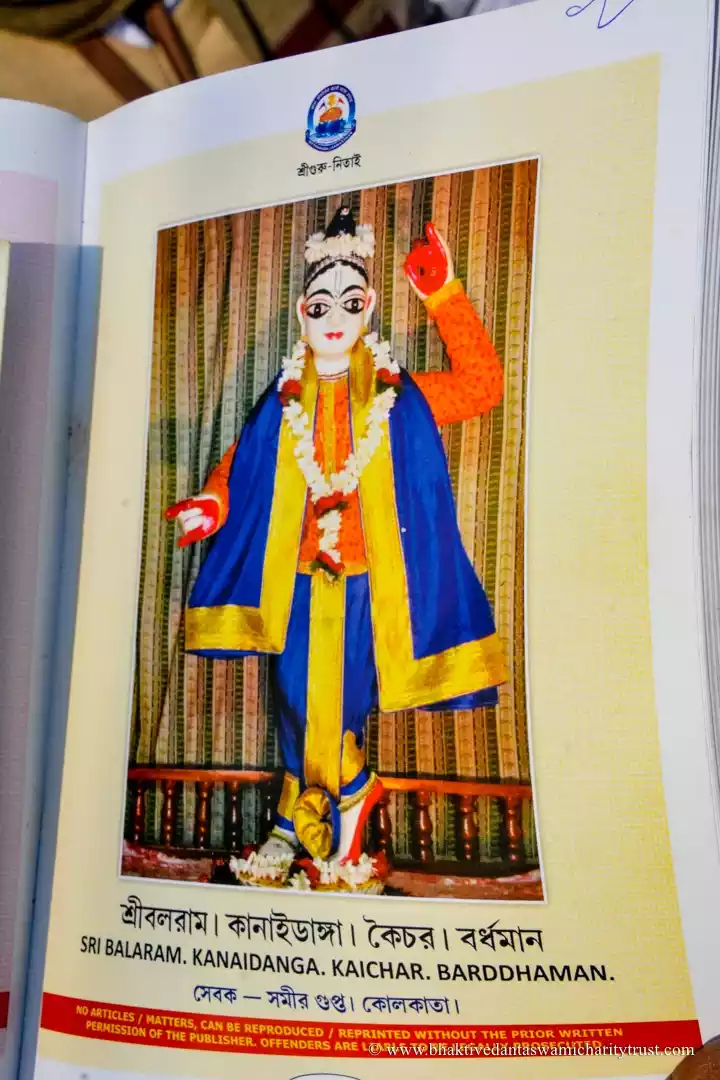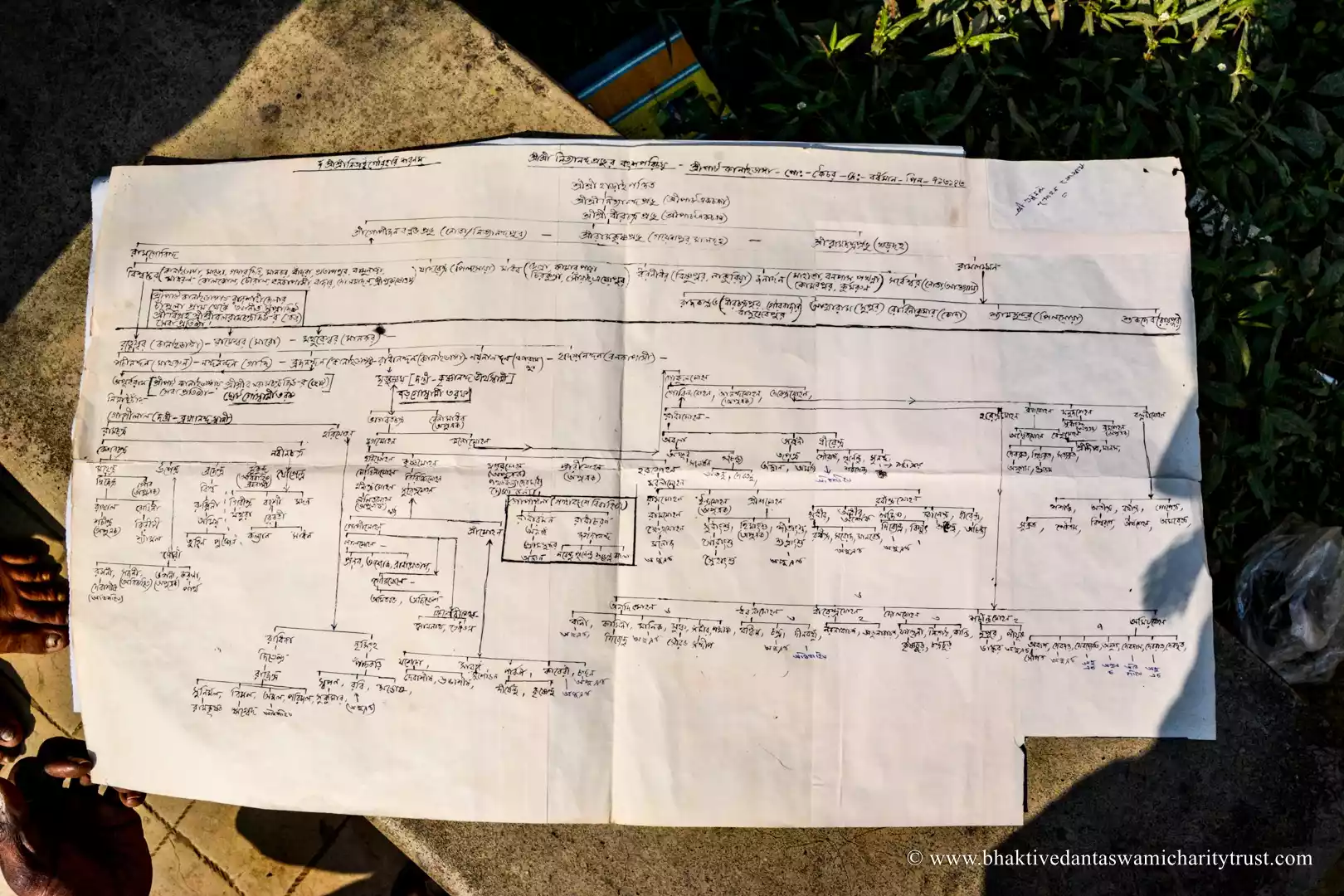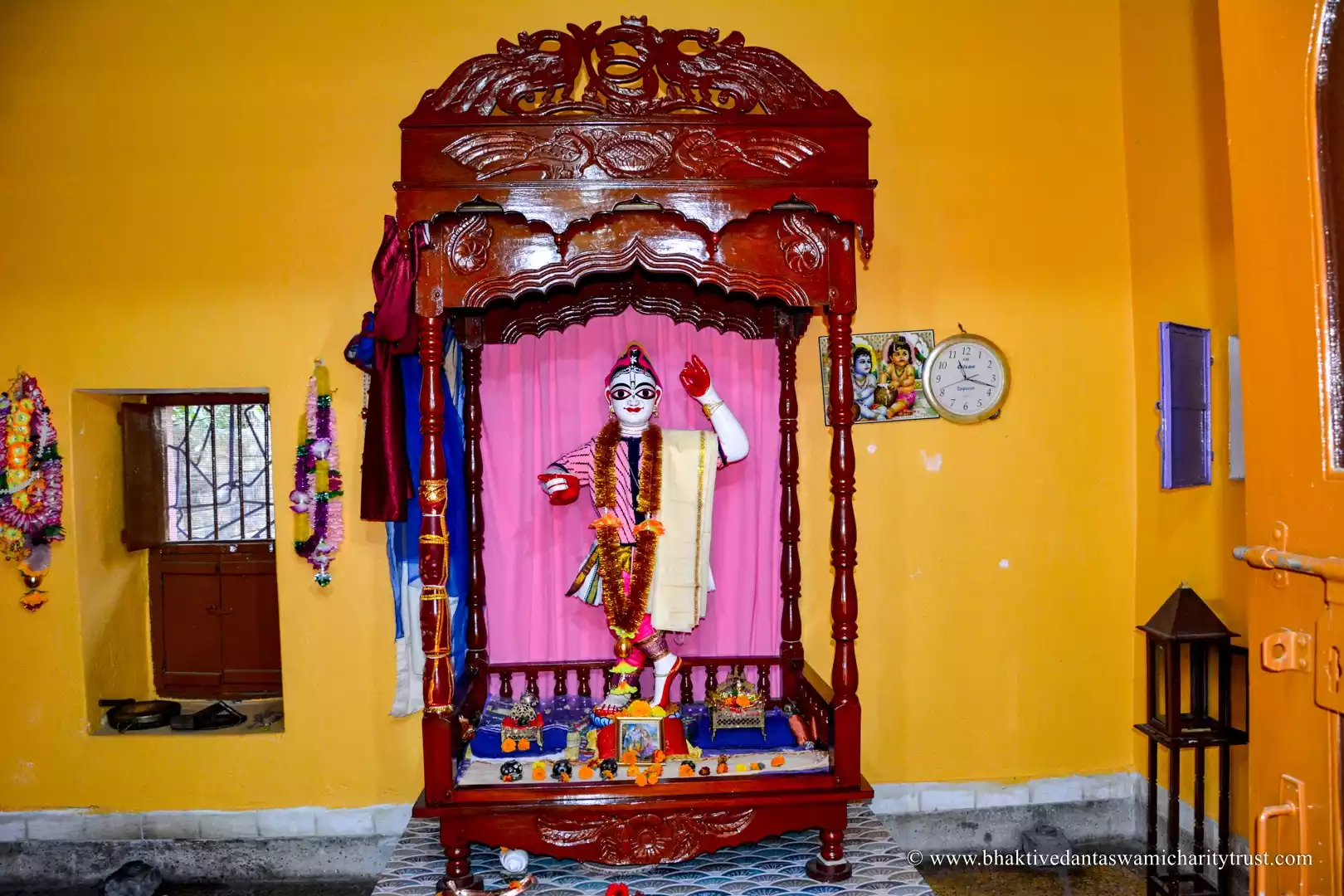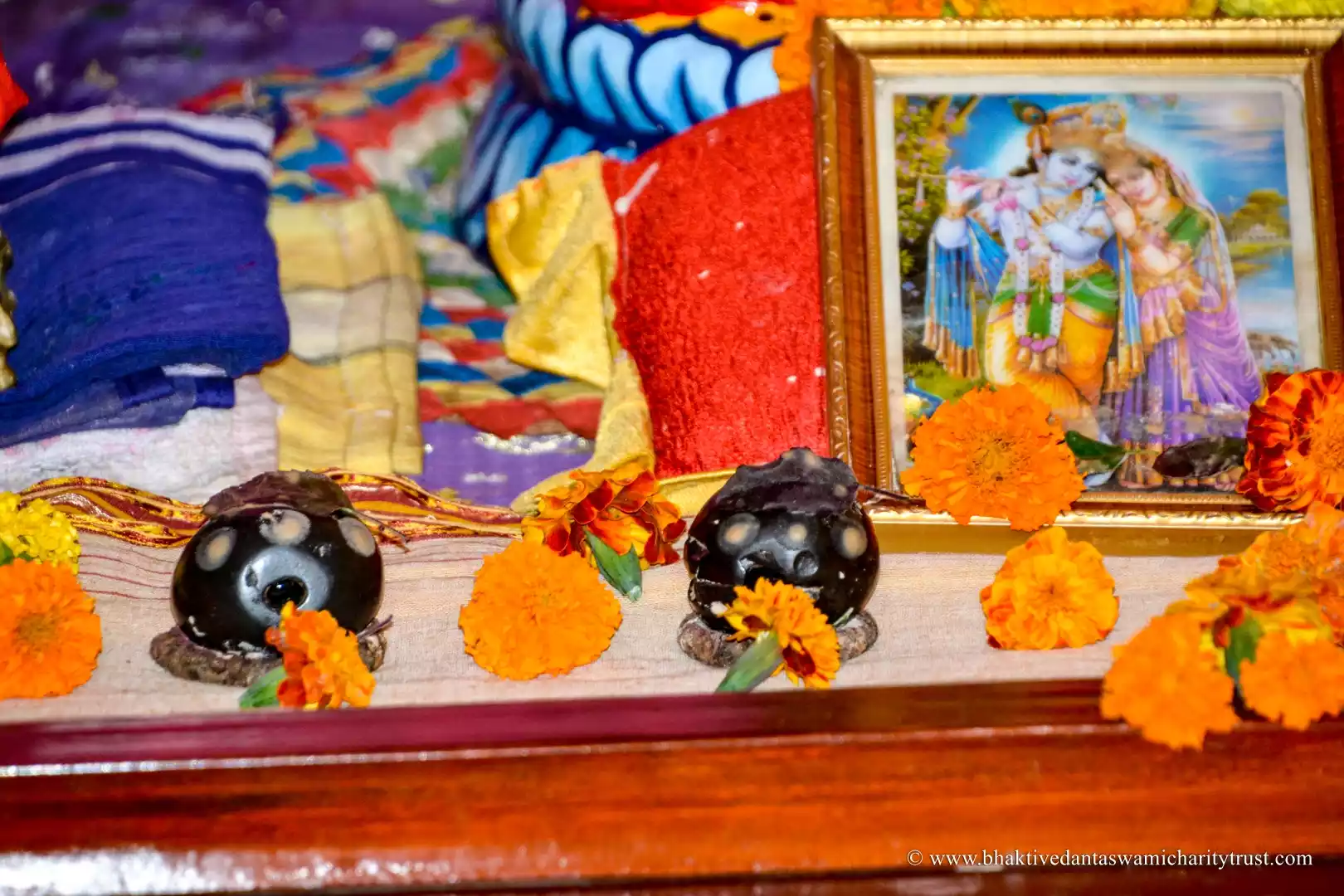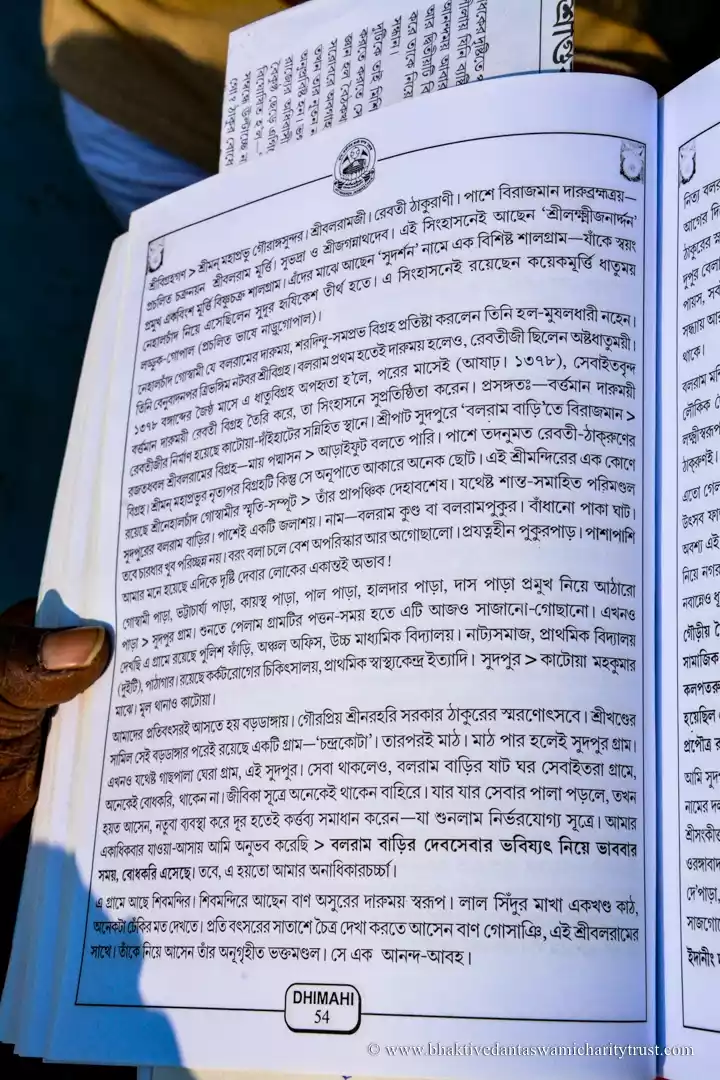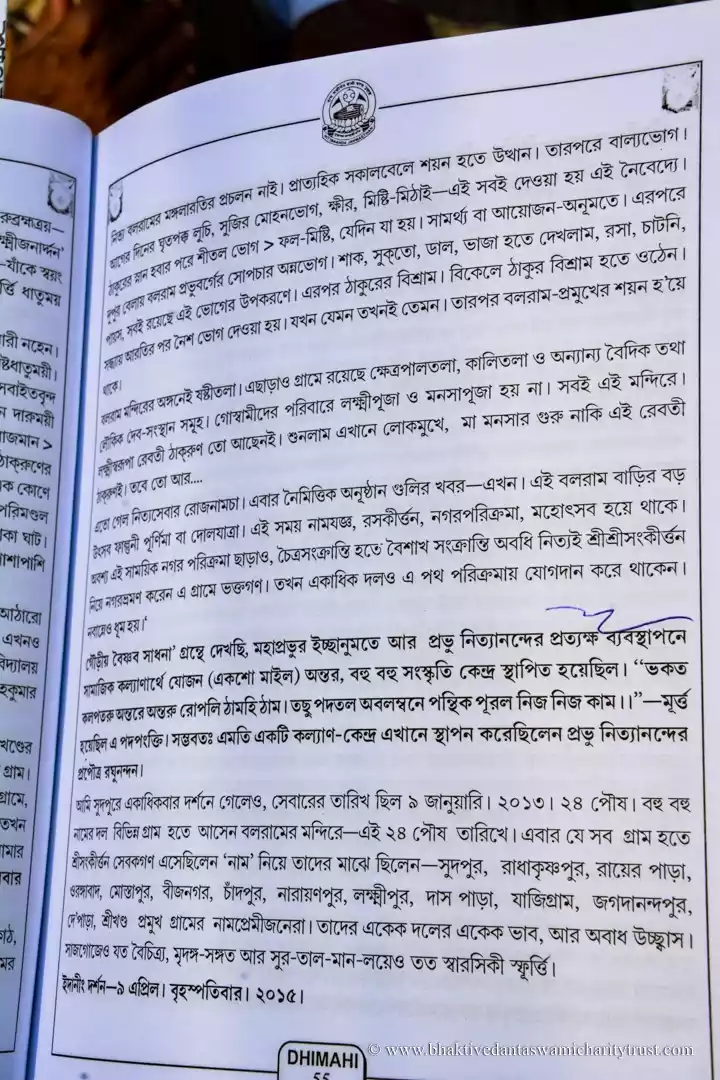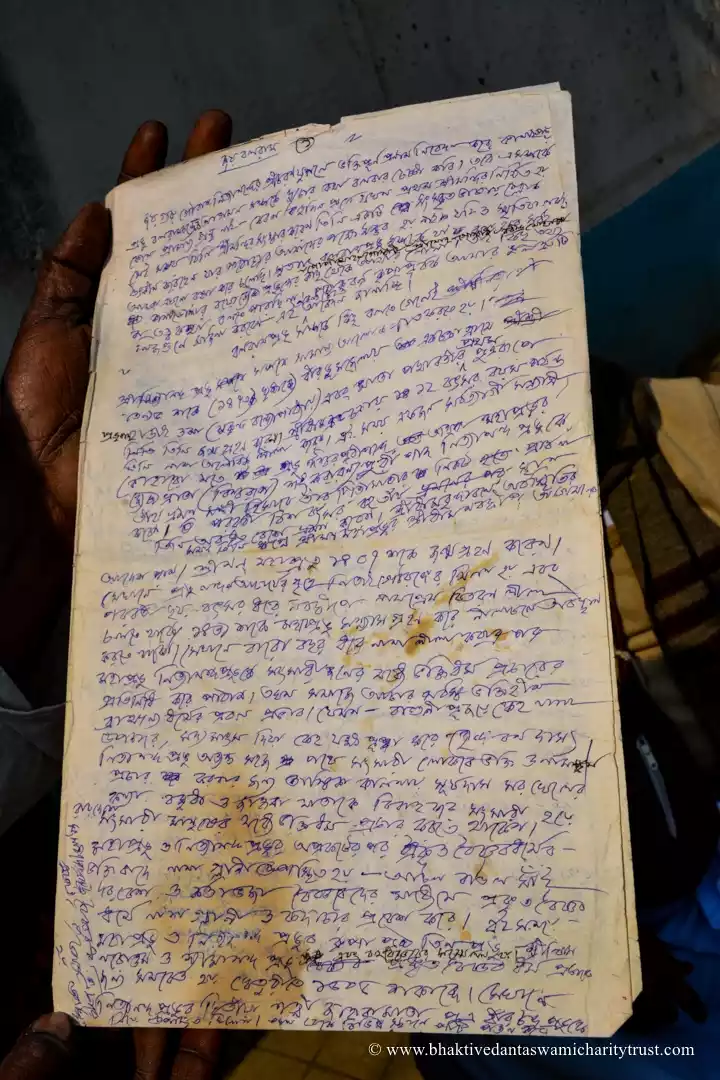Śrīkhaṇḍa
Description
Many Vaiṣṇavas and associates of Śrī Gaurāṅga appeared in this place like Narahari Sarkāra, Mukunda Dāsa, Raghunandana Dāsa, Cirañjīva Sena and Sulocana Sena, Gaurāṅga Dāsa Ghoṣāla, Madhusudana Dāsa Vaidya, Gopāla Dāsa Ṭhākura, Candraśekhara Vaidya, Mahānanda Majumdāra, Cakrapāni Majumdāra and his family poet Rāmagopāla and his son Pitāmbara, Yaśarāja Khāna, Dāmodara Mahākavi, Kavirañjana Rāghava Sena, Ātmārāma Dāsa and his son Nityānanda Dāsa and many others.
Śrīkhaṇḍa is situated in the district of Bardhamān. One can get down at Kāṭwā by train from Bandel and from there one can come to Śrīkhaṇḍa station by Kāṭwā- Bardhamān narrow-gauge railways. From there, towards one kilometer east, this Śrīkhaṇḍa Mahā-pāṭa is situated. Besides this, one can come to Śrīkhaṇḍa market place by bus through Kāṭwā-Bardhamān bus route and from there one can come to Śrīkhaṇḍa Mahā-pāṭa.
Śrīkhaṇḍa is the place where many associates of Gaurāṅga Mahāprabhu appeared and exhibited many pastimes. They are Narahari Sarkāra, Mukunda Dāsa, Raghunandana Dāsa, Cirañjīva Sena and Sulocana Sena, Gaurāṅga Dāsa Ghoṣāla, Madhusudana Dāsa Vaidya, Gopāla Dāsa Ṭhākura, Candraśekhara Vaidya, Mahānanda Majumdāra, Cakrapāni Majumdāra and his family poet Rāmagopāla and his son Pitāmbara, Yaśarāja Khāna, Dāmodara Mahākavi, Kavirañjana Rāghava Sena, Ātmārāma Dāsa and his son Nityānanda Dāsa and many others. Śrīkhaṇḍa has become ever glorious by the cultural heritage of Mukunda Dāsa, Narahari Sarkāra Ṭhākura and Raghunandana. Others have taken their ever glorious positions amongst the Vaiṣṇavas by their own respective cultural heritages. Śrī Gaurāṅga Deity of Ṭhākura Narahari Sarkāra, Madhu Puṣkaraṇī (Honey Pond), Baḍaḍāṅgi, Vṛndāvana-candra and Cirañjīva Sena’s place are worthy of being seen.
Once, Nityānanda Prabhu with His associates came to Śrīkhaṇḍa and revealed the glories of Narahari Ṭhākura which have been narrated in Vaiṣṇava songs as-
kahe nityānanda rāma
śuni madhumati nāma āsiyāchi tṛṣita haiyā
etaśuni narahari
nikaṭete jala heri sei jala bhājane bhariyā
āniyā dharila āge
madhu-snigdha miṣṭa lāge gaṇa saha khāya nityānanda
yata jala bhari āne
madhu haya tatakṣane punaḥ punaḥ khāite ānanda
madhumatī madhu dāna
svapārṣade kari pāna unmata avadhūta rāya
hāse kānde nāce gāya
bhūme gaḍāgaḍi yāya uddhava dāsa rasa gāya
Nityānanda Prabhu said, “Hearing the name of Madhumati, I came here being thirsty.” Hearing this, Narahari Ṭhākura fetched some water from a nearby place and put it in one vessel. He brought the same in front of Nityānanda Prabhu who drank the honey-like sweet water alongwith His associates. He was bringing water as much as possible and immediately it turned into honey. Nityānanda Prabhu joyfully drank it again and again. He, along with His associates, became intoxicated by drinking that honey-like water. He was laughing, crying, dancing and rolling on the ground in ecstasy. These mellows were sung by Uddhava Dāsa.
In this way, Nityānanda Prabhu revealed the glories of Prabhu Narahari Sarkāra Ṭhākura. The Pond adjacent to the temple from where Narahari Sarkāra Ṭhākura fetched water for Nityānanda Prabhu is still present by the name of ‘Madhu-puṣkariṇī’.
Once, when Śrī Abhirāma Ṭhakura was traveling for offering his obeisances to the Deities, he came to Śrīkhaṇḍa. He expressed his desire to see Raghunandana for revealing his glories. The father Mukunda Dāsa kept his son hidden behind closed doors. Then Abhirāma Ṭhākura, being depressed, went to a nearby solitary place called Baḍaḍāṅgi outside the village and sat over there. In the mean time Raghunandana came out from the room unseen to all and met Abhirāma Gopāla at Baḍaḍāṅgi. They embraced each other and were chanting and dancing in ecstasy. In that process, the ankle bell flew and fell off at Ākāihāṭa. These have been narrated in Vaiṣṇava songs as-
baḍaḍāṅgi nāme sthāna nirajane nairāśa haiyā basi
bujhi tāra mana śrī raghunandana alakṣite mile āsi
dekhiyā tāhāre daṇḍavat kare dui cāri pāṅca sāte
śrī raghunandana kari āliṅgana ānanda āveśe māte
eve duṅhu mili nāce kutūhalī nija paṅhu guṇa gāiyā
caraṇa jhāḍite nupūra paḍila ākāi- hāṭete yāiyā
In this way the glories of Raghunandana’s transcendental pastime exhibited in Baḍaḍāṅgi were unfolded in this world. Raghunandana’s service to Śrī Kṛṣṇa is famous and is known to everybody which has been described in Śrī Caitanya-caritāmṛta (Madhya- līlā, 15/128-129)-
raghunandana sevā kare kṛṣṇera mandire
dvāre puṣkaraṇī tāra ghāṭera upare
kadambera eka vṛkṣa phuṭe bāra-māse
nitya dui phula haya kṛṣṇa avataṅse
As translated by Śrīla Prabhupāda- Raghunandana is constantly engaged in serving the temple of Lord Kṛṣṇa. Beside the entrance of the temple is a lake, and on its banks is a kadamba tree, which daily delivers two flowers to be used for Kṛṣṇa's service.
Once, when Raghunandana was a child, Mukunda Dāsa went out somewhere for work by handing over the responsibility to him of serving his Bāla-Gopāla. According to the instructions of his father he took all the offering inside the temple and requested the Deity,
‘Please eat, my father told me to feed You.’ But Gopāla was not responding. After a while, Gopāla, by seeing Raghunandana’s devotion, ate the whole offering. After coming back home, Mukunda Dāsa heard everything and he became astonished.
Another day he instructed his son like before and kept himself hidden outside the room. Then another transcendental pastime was exhibited which has been described in a Vaiṣṇava song-
śrī raghunandana ati
haiyā haraṣita-mati gopīnāthe nāḍu diyā kare
khāo’ ‘khāo’ bale ghana
ardheka khāite hena samaye mukunda dekhi dvāre
yā khāila rahe tena
āra nā khāila punaḥ dekhiyā mukunda preme bhora
nandana kariyā kole
gada gada svare bale nayāne barikhe ghana lora
adyapi śrīkhaṇḍa-pure
ardha lāddu āche kare dekhe yata bhāgyavanta jane
abhinna madana yei
śrī raghunanadana sei e-uddhava dāsa rasa bhane
Śrī Raghunandana in a joyful mood offered the lāddu on the palm of Gopīnātha. He repeatedly requested Him to eat. When the lāddu was half eaten by Gopīnātha, He saw Mukunda was standing at the door. The rest half remained and He did not eat it again. Seeing this Mukunda was absorbed in love of Gopiīnātha. Mukunda took his son on his lap and said in a choked voice, ‘What a wonderful scene I have seen today.’ Till today the half eaten lāddu is there on the palm of Gopīnātha in Śrīkhaṇḍa and all the fortunate visitors can see this. Ṣri Raghunandana is non-different from Madana. These mellows are sung by Uddhava Dāsa.
In this way, the glories of Śrī Raghunandana were revealed. Beside the temple, the samādhi of Ṭhākura Narahari is situated. Festival on the occasion of Ṭhākura Narahari’s disappearance was celebrated on the eleventh day of the waxing moon in the month of Agrahāyaṇa (November-December). All the associates of Mahāprabhu residing in Gauḍa-maṇḍala gathered in Śrīkhaṇḍa at that time and the whole Śrīkhaṇḍa was filled with the waves of Saṅkīrtana performed by them. At the end of bhoga offering to the Deity when Śrī Raghunandana offered the prasada to Narahari Sarkāra Ṭhakura, he directly came there and ate that praṣāda. This has been narrated in Bhakti Ratnākara (Taraṅga, 9/695-696) as-
bāhire āsiyā rahilena katakṣaṇa
samaya jāniyā cale dite ācamana
dvāra ghucāiyā dekhe prabhu narahari
āsane basiyā āche divya-rūpa dhari
Big festival is performed on that tithi till today. Śrī Raghunandana disappeared in this place and Ṭhākura Kānāi performed the festival of his disappearance.
Śrī Cirañjīva Sena, the associate of Gaurāṅga Mahāprabhu got married at Śrīkhaṇḍa. Then he went to Kumārnagara and resided there. The poet Govinda Dāsa took birth there in the house of his maternal grand-father Śrī Dāmodara Kavirāja. The worship of Śrī Vṛndāvana-candra is there at Śrīkhaṇḍa in the house of Ṭhākura Narahari’s disciple Śrī Cakrapāṇi Majumdāra. Two brothers Mahānanda and Cakrapāṇi started the worship of Śrī Vṛndāvana-candra as per the instructions of Mahāprabhu. The glories of Śrī Vṛndāvana-candra have been described in Śrī Raghunandana Śākhā Nirṇaya as-
khañja chāḍi gauḍa-deśe karilā gamana
padmāya ḍubiyā naukā sabe gelā bhāsi
vakṣe vṛndāvana-candra tina dina upavāsī
bhāsite bhāsite gelā prakhaḍiyā grāma
prācīna loke kahe tathā karilā viśrāma
vṛndāvana-candrera ghāṭa sei sthāne haya
navīna vṛndāvana-candra ekhana tathāi āśraya
ṭhākura lañā khaṇḍe āsi sevā ārambhilā
tāhāra gharaṇī mālinī sevā aneka karilā
dugdha sara-bhājā āra vyāñjana paripāṭi
adyabadhi āche mandirera iṅṭa-māṭi
He went to Gauḍadeśa leaving Khañja. The boat drowned in Padmā River and everything was lost. Vṛndāvana-candra was tightly held upon the chest and He was fasting for three days. Floating in the water he reached at Prakhaḍiyā village where, the people say, He took rest. That bathing ghāṭa’s name became Vṛndāvana- candra’s ghāṭa where He took shelter. Taking the Deity with him, he came to Śrīkhaṇḍa and started his worship. His wife Mālinī Devī rendered many services to the Lord. She cooked many nice vegetables, various preparations from milk and many other items. Bricks and soil of the temple are still present there.
Śrī Vṛndāvana-candra is exhibited till today at Śrīkhaṇḍa. The descendants of Śrī Cakrapāni Majumdāra are continuing to serve Vṛndāvana-candra in turn by taking Him from one house to another.
Once upon a time, Narahari Sarkāra Ṭhākura, Mukunda Dāsa and Raghunandana went to Nīlācala to meet Mahāprabhu. After the Ratha-yātrā, Mahāprabhu had Iṣṭogasṭhi with the devotees and there He asked Mukunda Dāsa, “O! Mukunda, some time I forget who is father and who is son amongst you.” Then Mukunda Dāsa replied, ‘Raghunandana is the father. All of us got devotion to Kṛṣṇa from Raghunandana.’ Mahāprabhu immediately replied, “He from whom we get devotion to Kṛṣṇa is our Guru or Father.” Then Mahāprabhu fixed the service for them. He told Mukunda Dāsa, “You will earn money.” He told addressing Raghunandana, “Raghunandana can not live without serving Kṛṣṇa; he will serve Kṛṣṇa staying at home. Narahari Sarkāra Ṭhākura will travel and preach the glories of Harināma with My followers.” In this way He engaged the three devotees in three different services.

